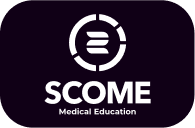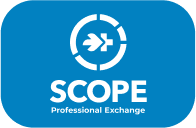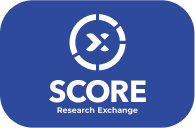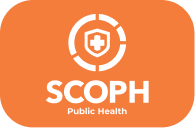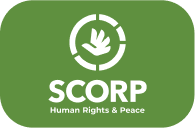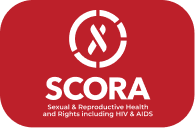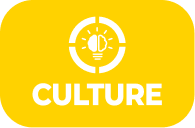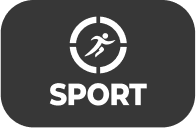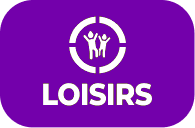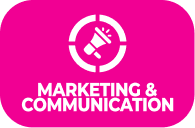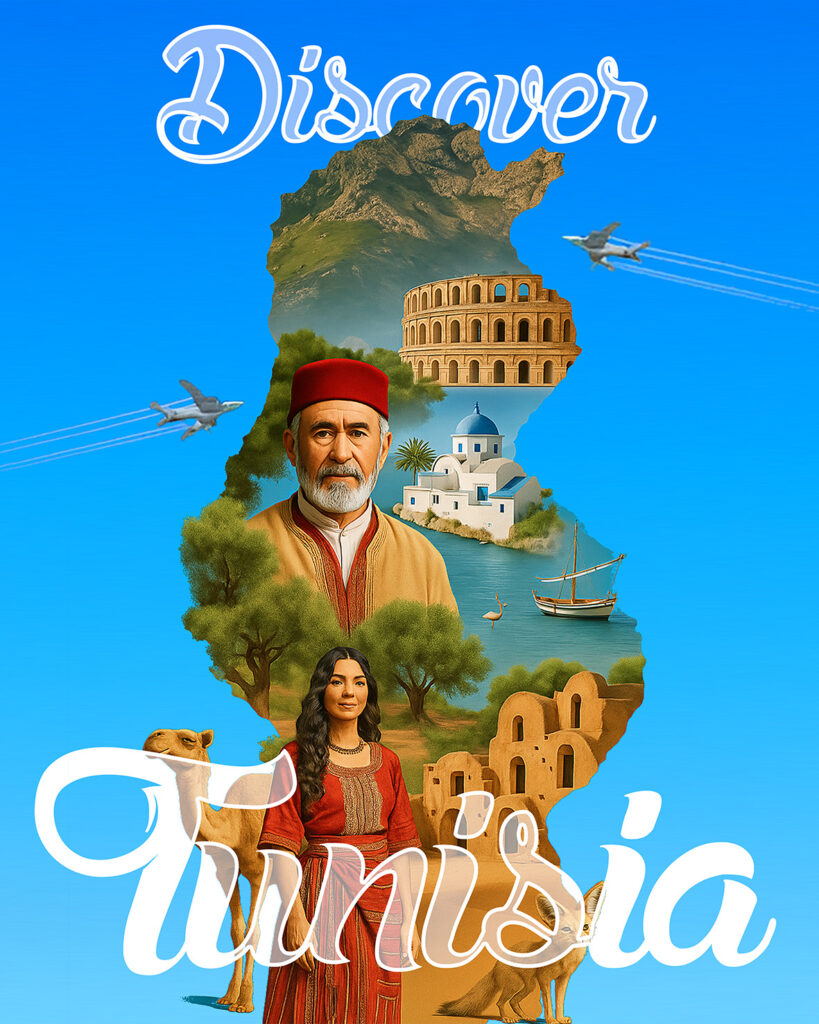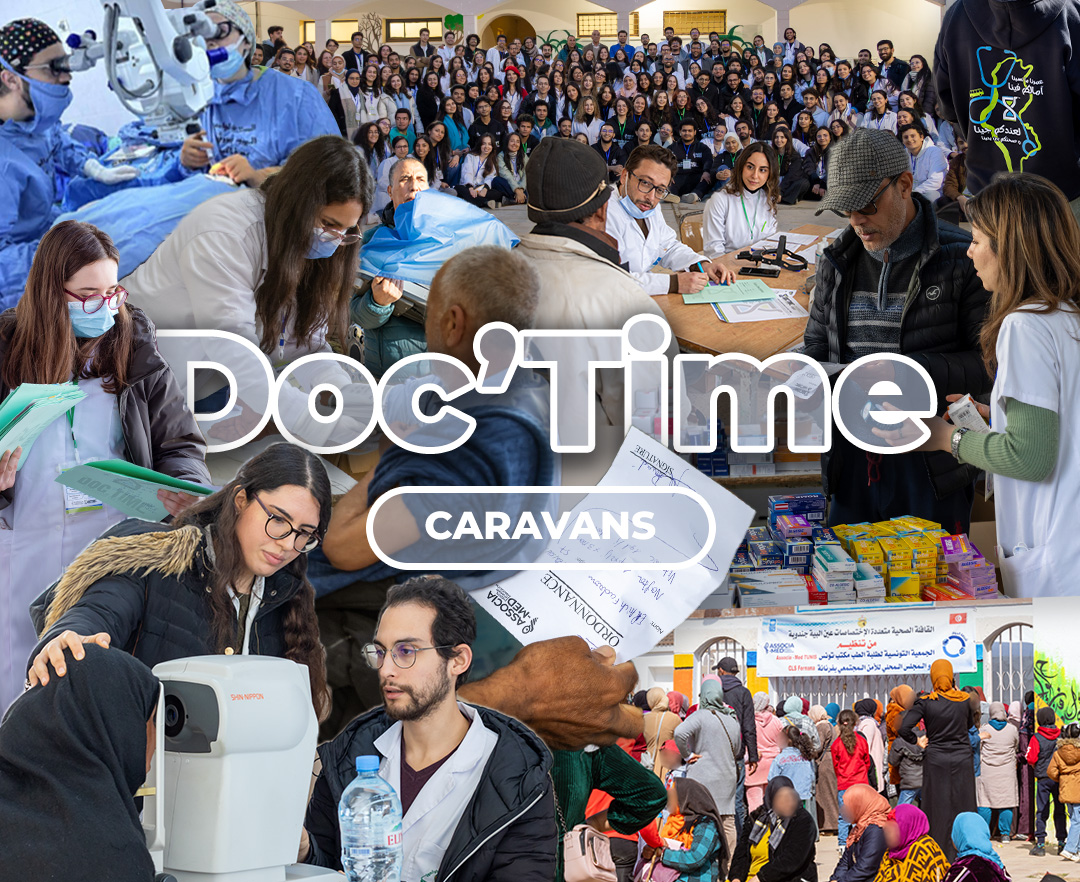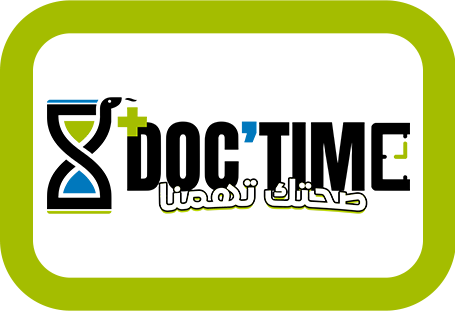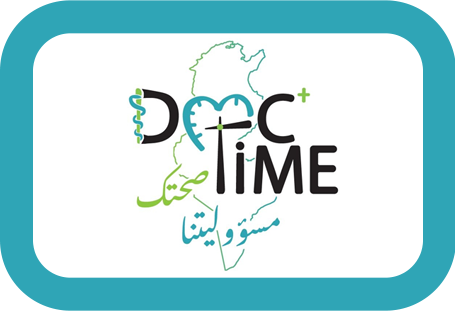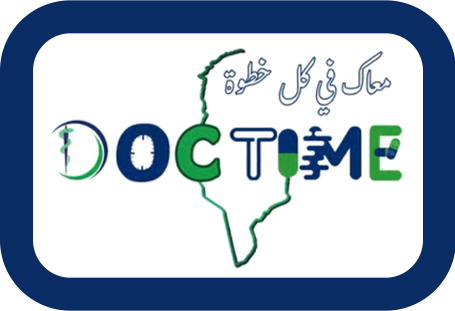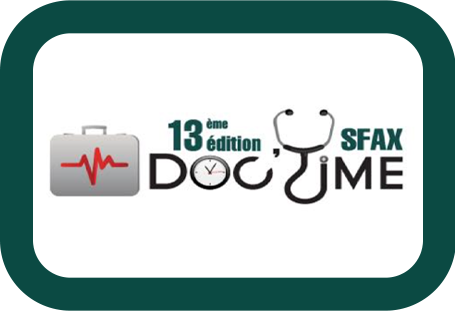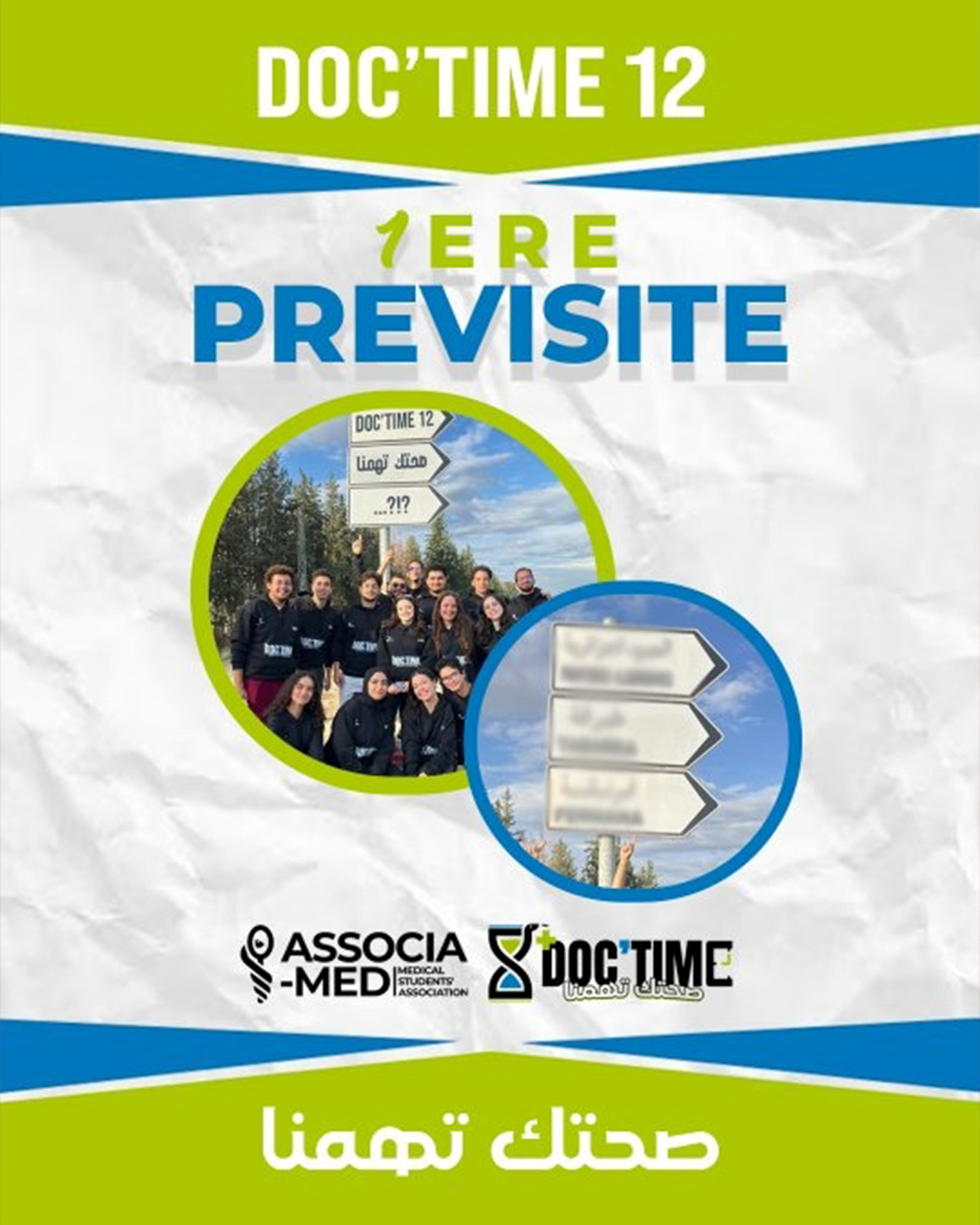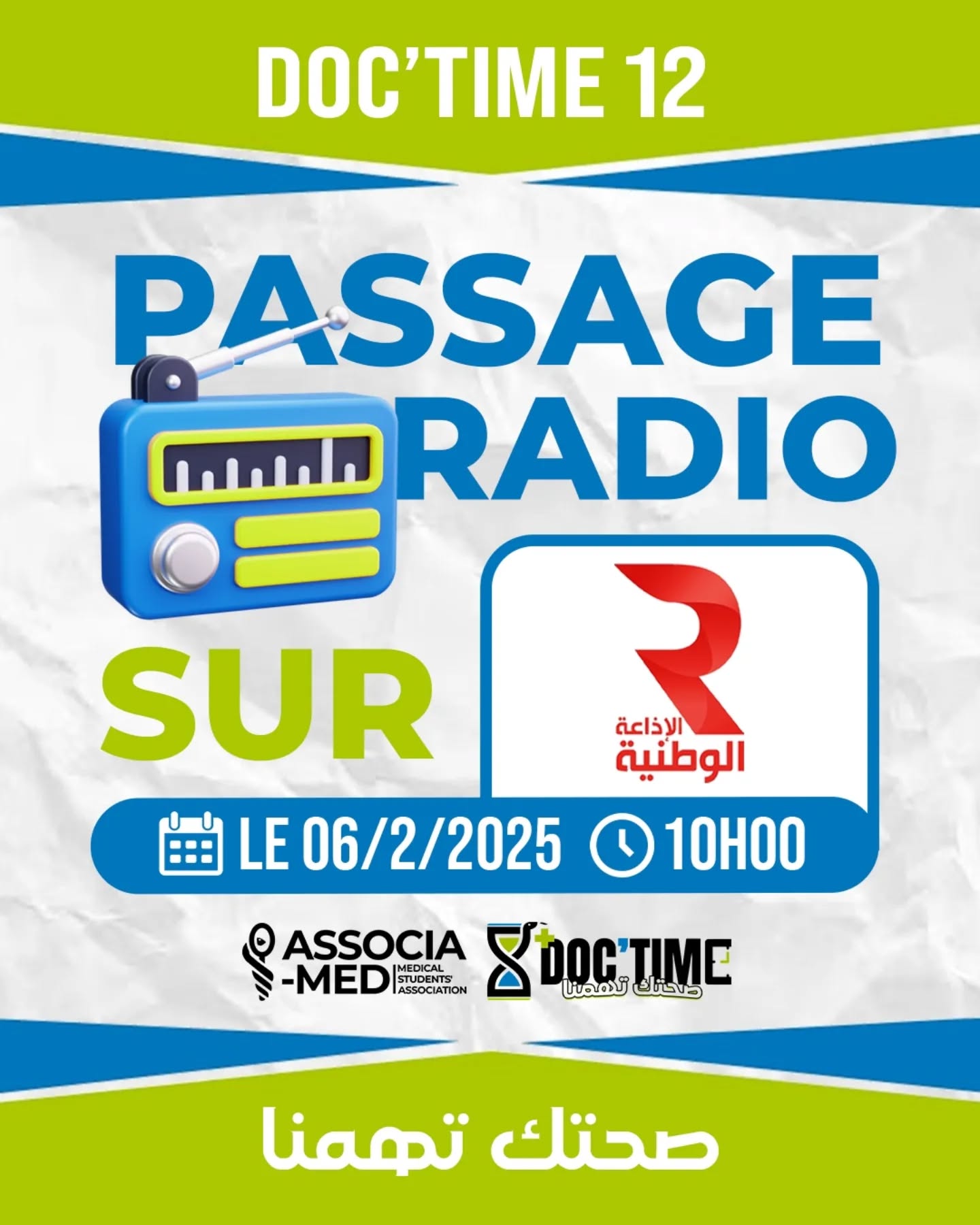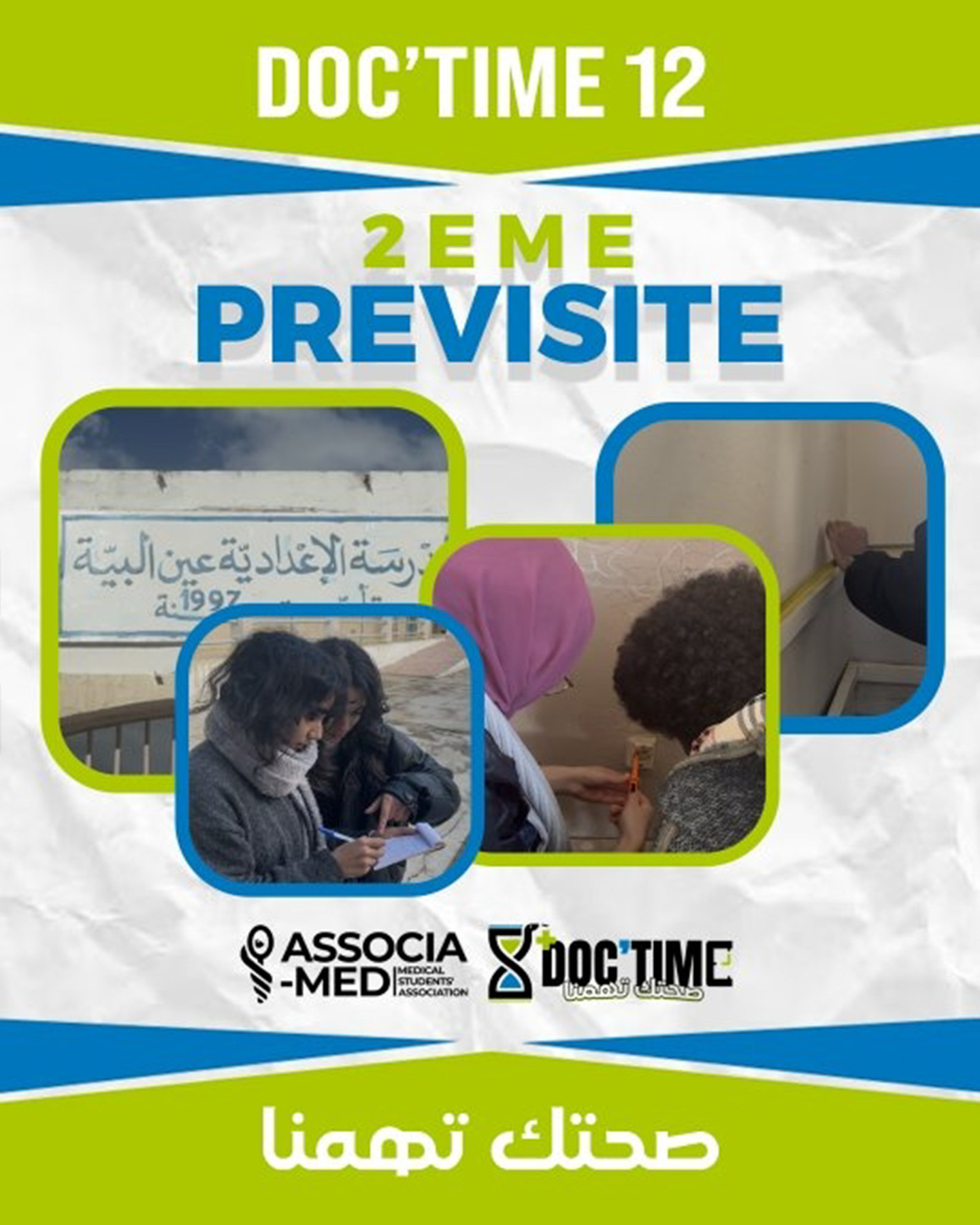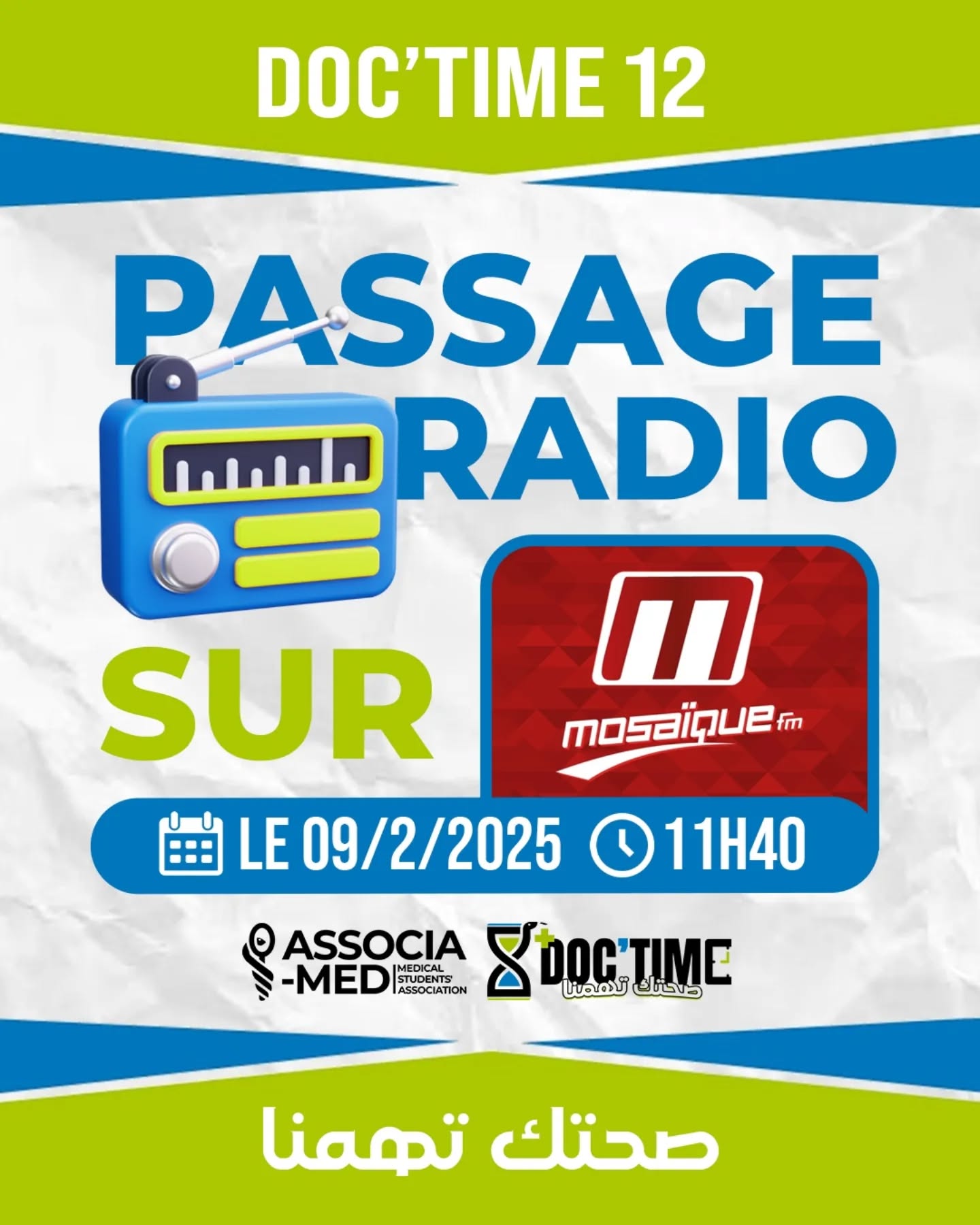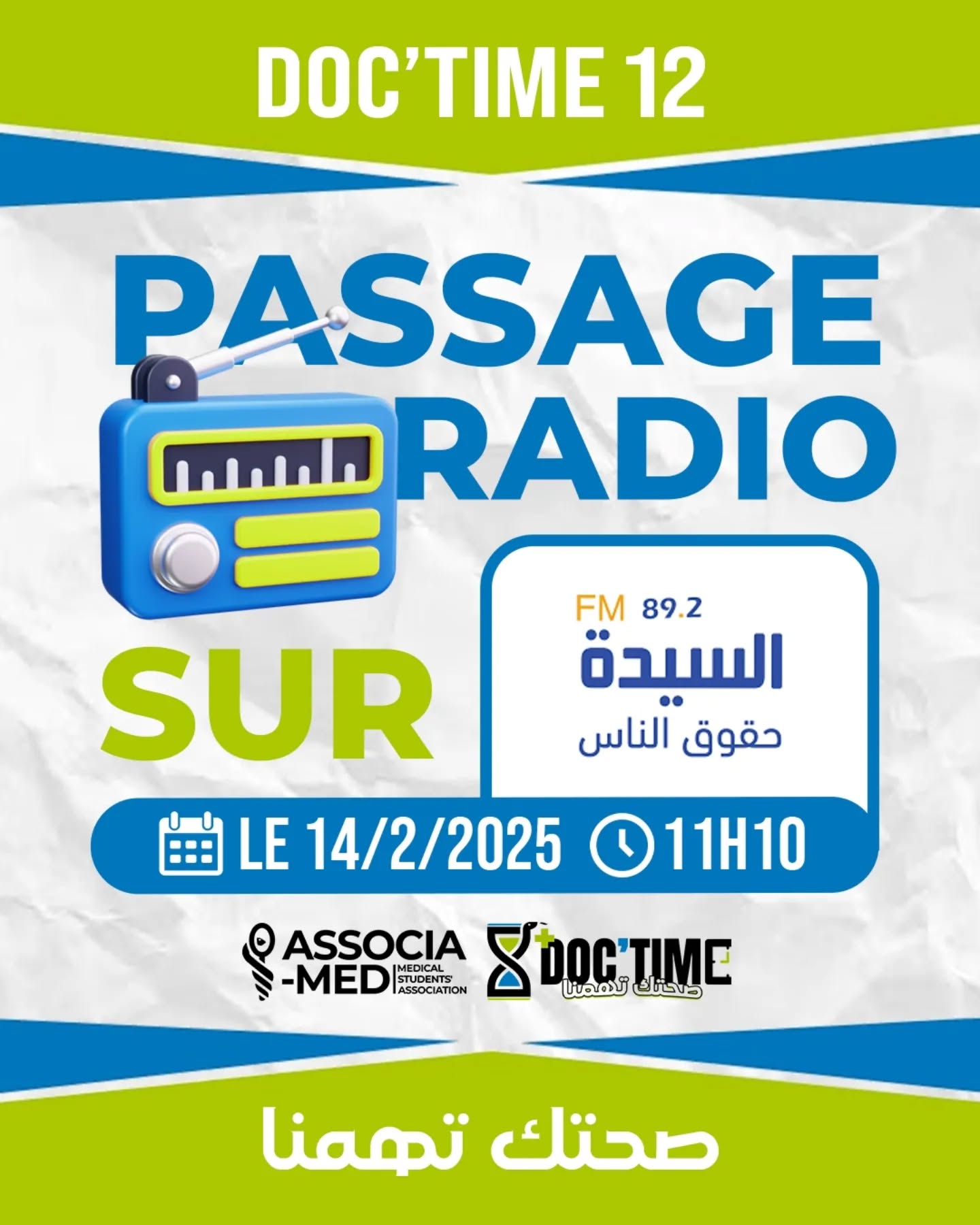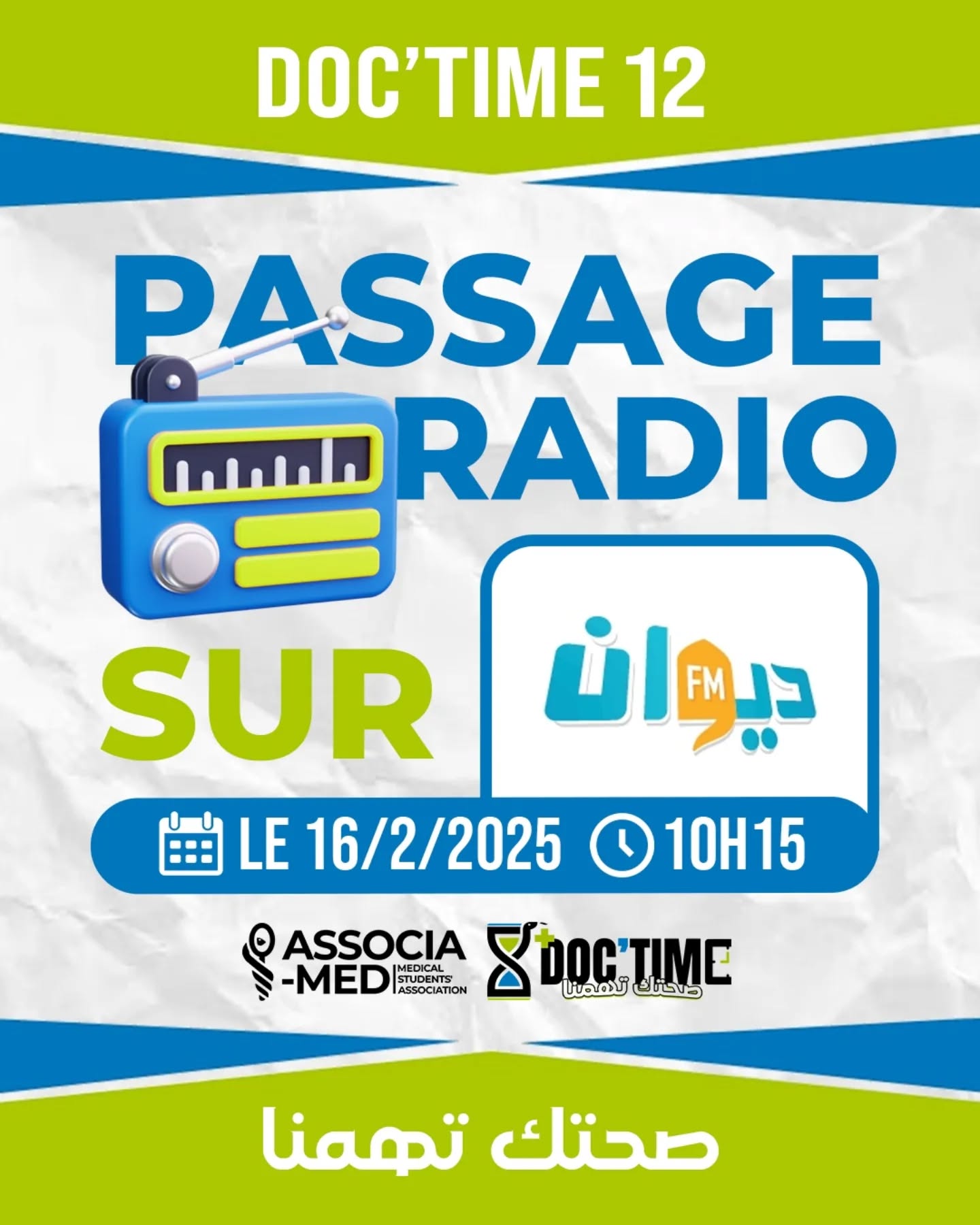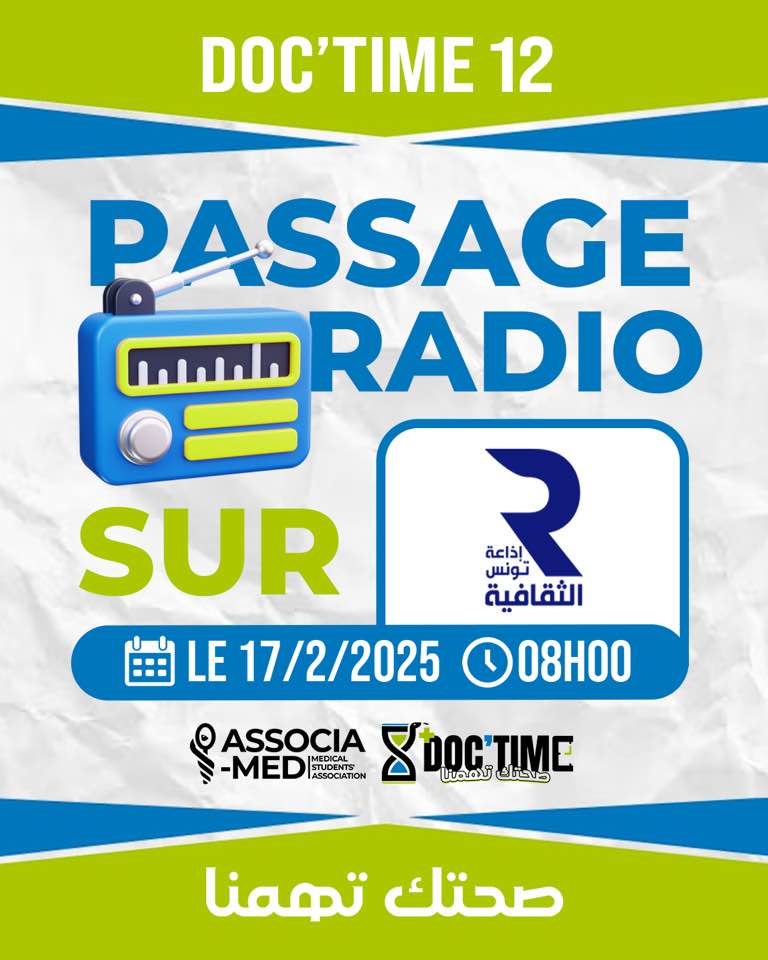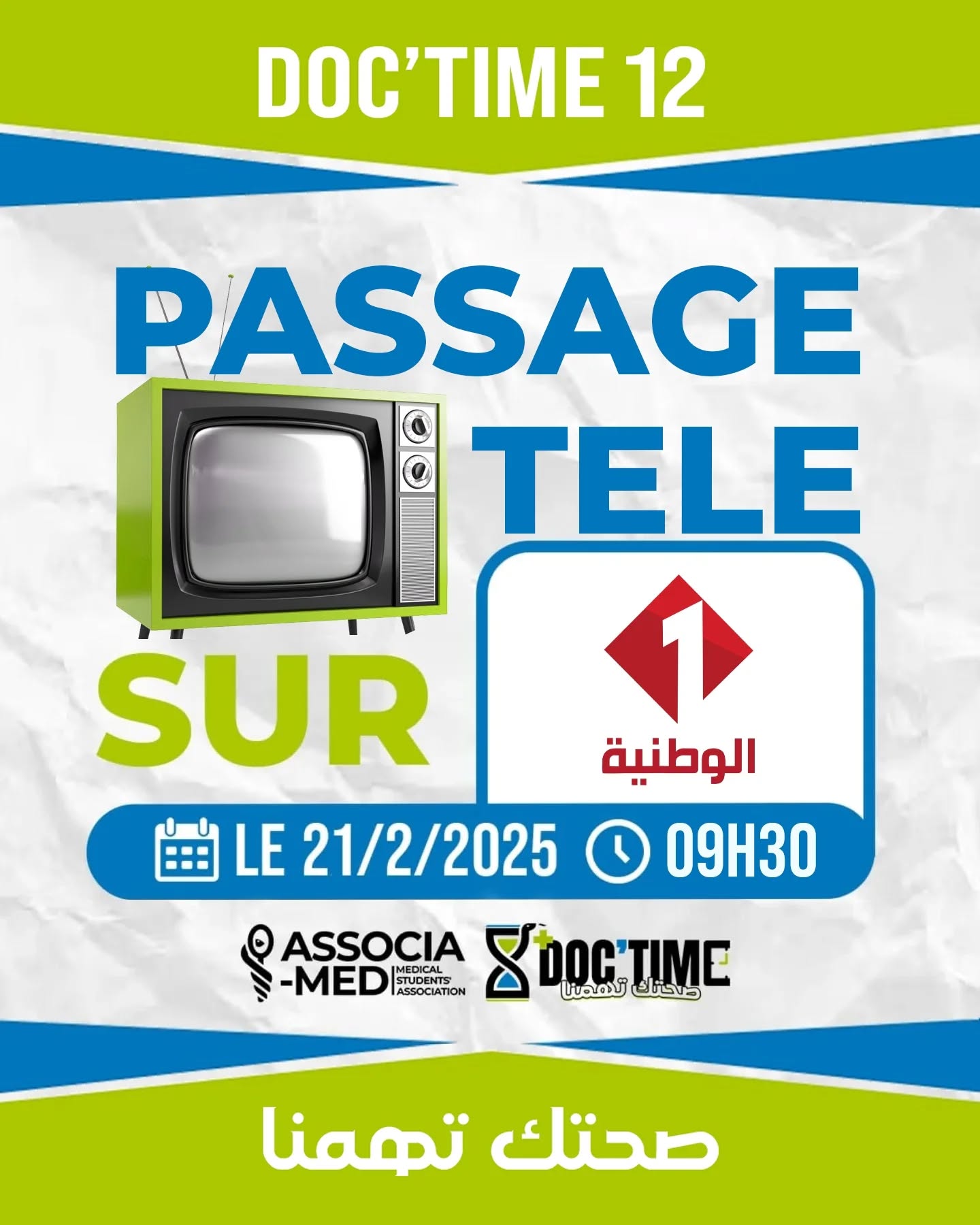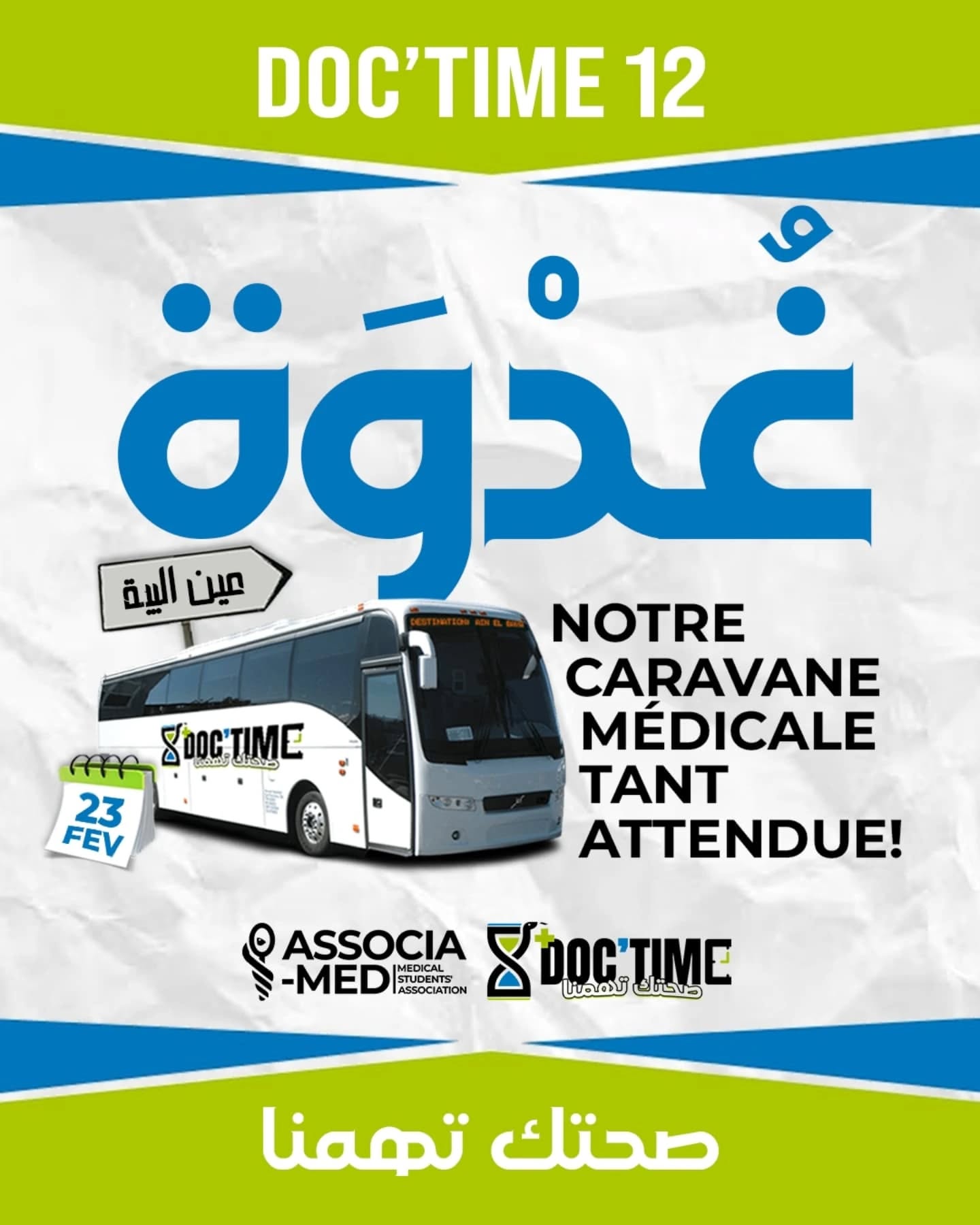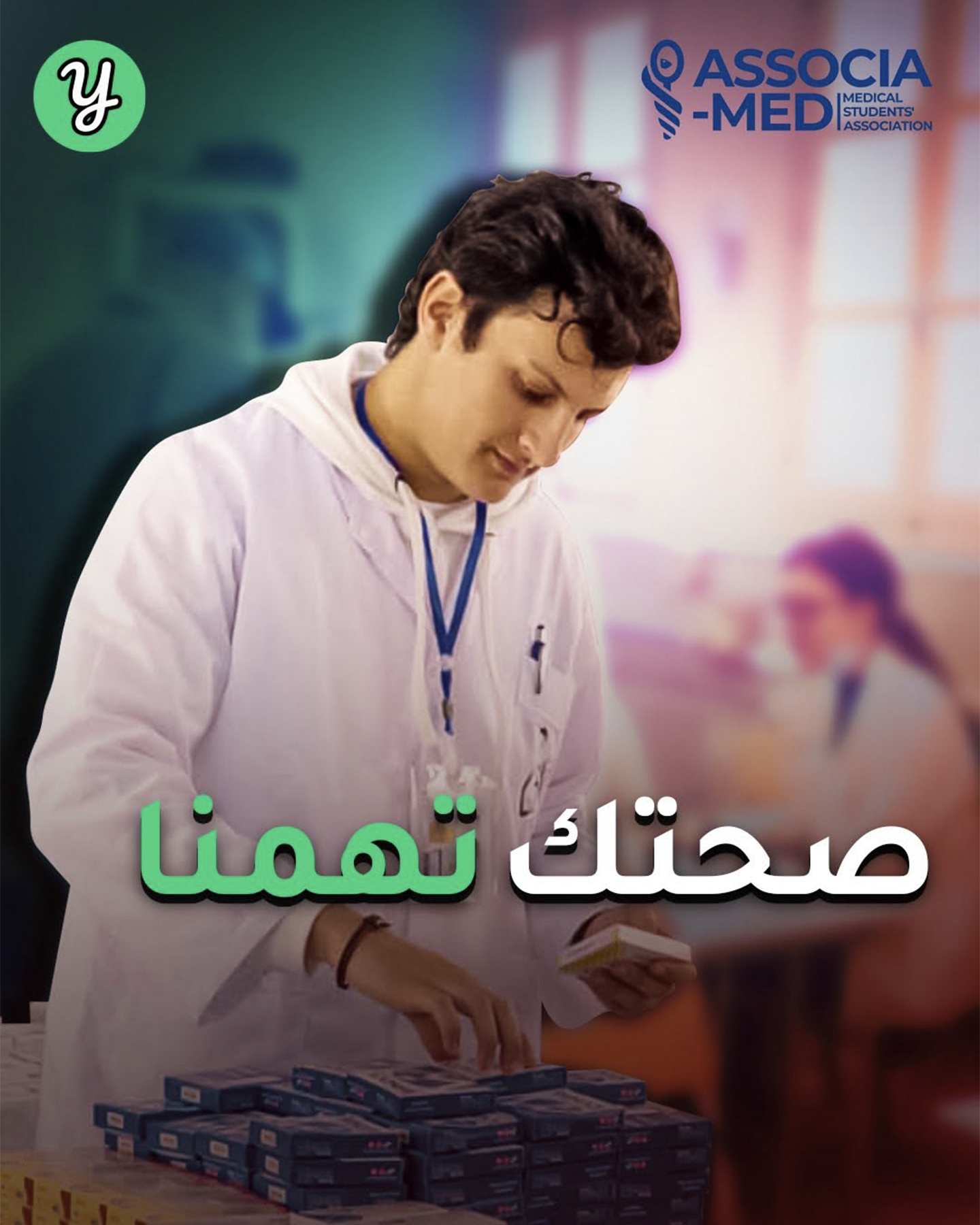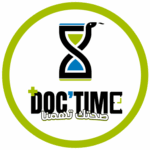
About
Us
A Health Convoy for Human Rights and Peace
Doc’time Tunis is a multi-disciplinary medical and surgical health caravan dedicated to advancing the right to access healthcare in Tunisia. Operating under the Committee on Human Rights and Peace of the Local Committee of Tunis of Associa-Med Tunisia, this initiative aligns with Sustainable Development Goals (SDG):
- 3 (Good Health and Well-being)
- 10 (Reduced Inequalities)
- 16 (Peace, Justice, and Strong Institutions).
We go as far as it takes to provide health to anyone, wherever they may be.
Our
Vision
Patient-Centered Care
Doc’time Tunis embodies the core principles of patient-centered care. We believe that healthcare should be a right, not a privilege. By bringing medical services directly to underserved rural regions, we address the critical gap in healthcare access, ensuring that even the most isolated populations receive the quality care they deserve. This proactive approach tackles the problem of healthcare being limited by financial means or access to transportation in Tunisia.
This initiative is part of the IFMSA Program for Ethics and Human Rights in Health (EHRH). Through this program, we are committed to nurturing a new generation of physicians who prioritize patient dignity and rights, ensuring that every healthcare interaction is guided by justice, empathy, and unwavering ethical integrity.
Relive
Doc'Time
Relive Older Doc'Times
Medical
Caravan
Our medical caravan isn’t just a single event; it’s a carefully planned process to ensure we provide the most effective care possible to those who need it most. Our approach is methodical and patient-focused, broken down into several key stages:
Needs Assessment
We start by identifying a needy area based on statistical data. This initial research helps us pinpoint regions with the greatest healthcare disparities.
Pre-Visits
Before any a caravan is planned, our teams conduct a series of pre-visits. The first visit confirms the needs of the community and the suitability of the location. A second visit focuses on logistics, mapping out everything from the layout of our temporary hospital to transportation routes.
Pre-Caravan
A pre-caravan team then goes to the area to spread the news. They make sure everyone knows about the upcoming free medical caravan, building trust and ensuring the community is ready to receive us.
Setting Up Our "Hospital"
The day before the event, our team arrives to transform a local high school into a fully functional, temporary hospital with over 20 examination rooms.
Our Strategy: Behind the Scenes
The success of our medical caravan is built on a comprehensive strategy that extends far beyond the event itself. Before we ever reach a community, we undertake several critical tasks to ensure our mission is effective.
Fundraising and Partnerships:
We actively collect donations from patrons, not sponsors. These funds are given with no benefits in return, allowing us to acquire essential medical supplies and equipment. We also raise funds through dedicated projects like the “DocShowTime” charity concert and by setting up stands in commercial centers to collect donations.
Logistical Preparation:
We manage all logistical needs, from sourcing medical equipment like imaging devices, ultrasound machines, and ECGs to coordinating transportation. We bring everything we need to be fully self-sufficient, including conducting late-night sorting of medications to ensure our pharmacy is ready.
Doctor Recruitment:
We contact and coordinate with a diverse team of doctors and specialists whose expertise allows us to offer a wide range of services.
Media and Outreach:
We use various platforms, including radio and television, to raise awareness and showcase our project’s mission, which helps us attract volunteers and support.
Doc'Time 101:
Before each caravan, we conduct “Doc’Time 101,” a mandatory training program to prepare medical students for their roles and responsibilities during the event.
The Patient Journey
When patients arrive at our temporary hospital, they are guided through a carefully designed circuit to ensure they receive comprehensive and efficient care. Every step is tailored to their needs, from initial screening to receiving free medication.
Initial Screening
The journey begins in the "depistage"(screening) room. Here, every patient undergoes a systematic check of their blood sugar level and blood pressure. This essential first step helps us identify immediate health concerns.
Triage
Following the initial screening, patients are directed to the triage area. Our medical students and doctors assess their health needs and guide them to the appropriate medical specialties. The specialists available in our caravan are chosen based on the most common epidemiological needs of the region we are serving.
Women's Health
For all women, a visit to the gynecologist is a standard part of their journey. They receive a systematic cervico-vaginal smear (frottis) and a breast cancer screening, ensuring that critical women's health needs are addressed proactively.
Specialized Consultations
Patients receive consultations in various specialties, which may include ophthalmology, cardiology, and more, depending on the needs of the community. We are equipped with all the necessary tools, including imaging devices, ultrasound machines, and ophthalmology tools, to provide a thorough examination.
On-site Pharmacy
After their consultations, patients visit our on-site pharmacy. Here, they receive all their prescribed medications completely free of charge. This final step ensures that the care provided is not limited by the patient's ability to afford their treatment.
Post-Convoy
Follow-up
Our Lasting Impact
At Doc’Time, we believe the real impact begins after the caravan departs. The medical convoy is just the first step in a patient’s journey toward lasting health. Our commitment to continuity of care is what truly sets us apart.
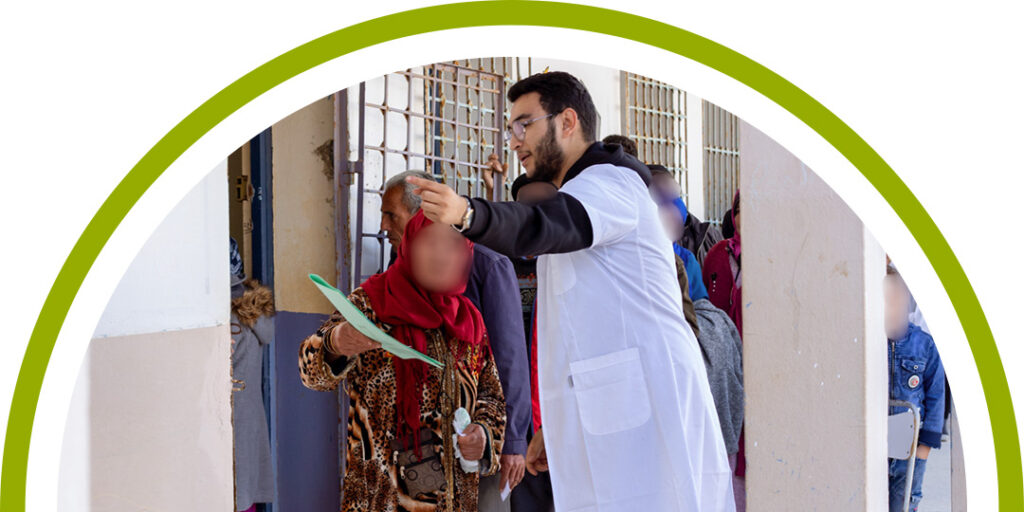
Guiding Patients Through the Healthcare System:
We don’t just treat; we empower. Our team works to guide and introduce patients to the nearest and most accessible healthcare systems. We meticulously explain the next steps in their care, ensuring they know how to navigate the system to complete their follow-up and maintain continuous access to health services.
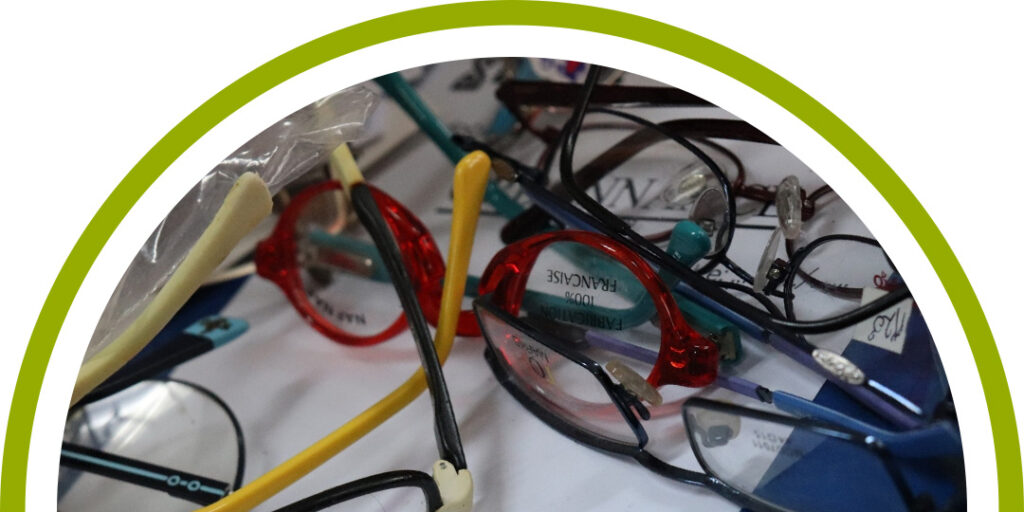
Providing Prosthetics and Devices:
For those in need of eyeglasses or hearing aids, we take precise measurements during the caravan. We then prepare these devices and return to the community to distribute them, ensuring patients receive the tools they need to improve their quality of life.
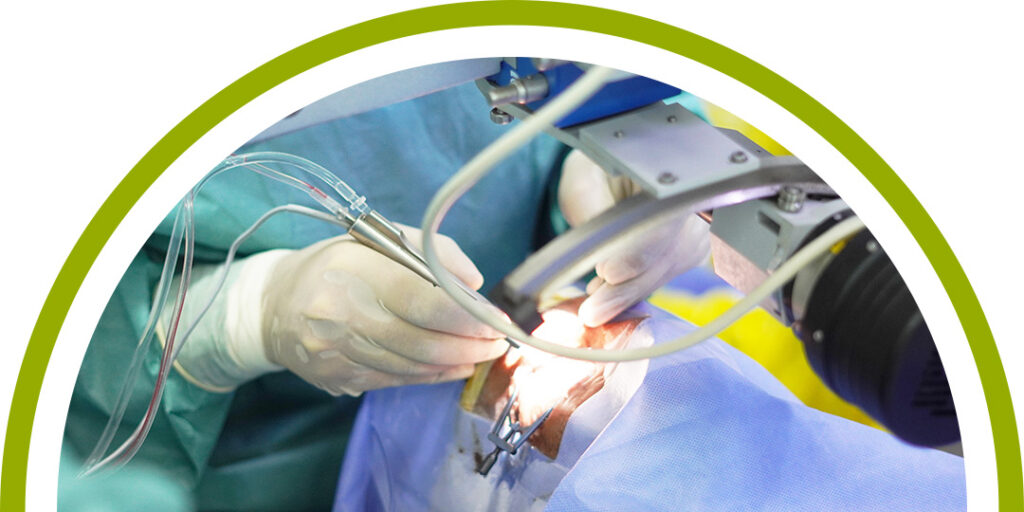
Specialized Surgical and Dental Convoys:
For patients requiring surgery, our commitment is unwavering. We organize dedicated caravans for specific needs, including an ophthalmic and cataract surgery convoy and a dental caravan. For general surgeries, pre-operative assessments, and other exploratory procedures, we are present at every step, organizing and facilitating their care.
Our
Impact
A Decade of Service
From 2017 to 2025, Doc’time has made a significant and lasting impact on healthcare access across Tunisia. Our commitment to patient-centered care has led to the successful execution of 12 medical convoys in 8 different regions.
+12000
Consultations
+75OO
Screenings
+300
Cervico-Vaginal Smears
+1200
Pairs of Eyeglasses
+300
Cataract Surgeries
+45
General Surgeries
Consultations
Screening
Cervico-Vaginal Smears
Eyeglasses
Distributed
Cataract
Surgeries
General
Surgeries
Doc'Time
XII

Our 12th medical convoy, Doc’Time XII, took place on February 23, 2025, marking a new chapter in our mission to reach underserved communities.
Location: Ain El Baya, Fernana, Jendouba
Why Ain El Baya?
This mountainous, rural area suffers from a severely underdeveloped healthcare infrastructure. Our pre-caravan assessment revealed a critical need for our services:
Limited Healthcare Access
The region has only a single clinic that operates just one day a week, where it receives over 100 patients.
Lack of Specialized Services
The local hospital in Fernana (12 km away) has only nine general practitioners and lacks basic diagnostic equipment like X-ray and ultrasound machines.
Geographical Barriers
The nearest fully equipped hospital is 35 km away in Jendouba, accessible only via a difficult, rugged road.
Timeline: From Planning to Impact
The success of Doc’Time XII was the result of months of meticulous planning and preparation.
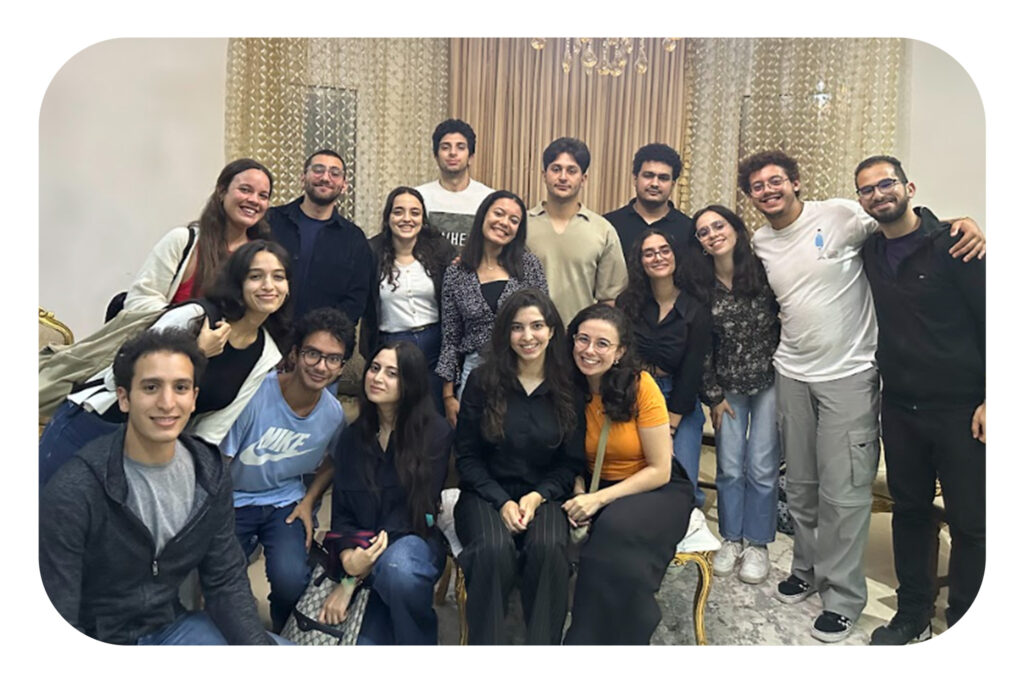
The initial team meeting for teambuilding and a preliminary epidemiological study, leading to the decision to target the Jendouba region.
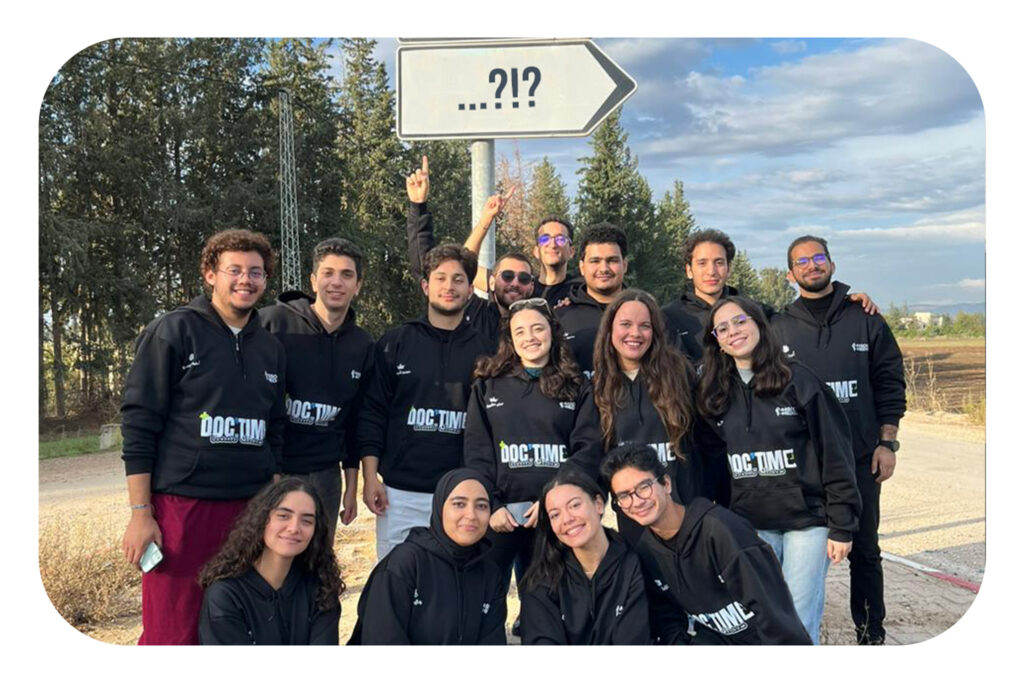

The team traveled to Jendouba to finalize the destination, officially choosing Fernana and Ain El Baya.
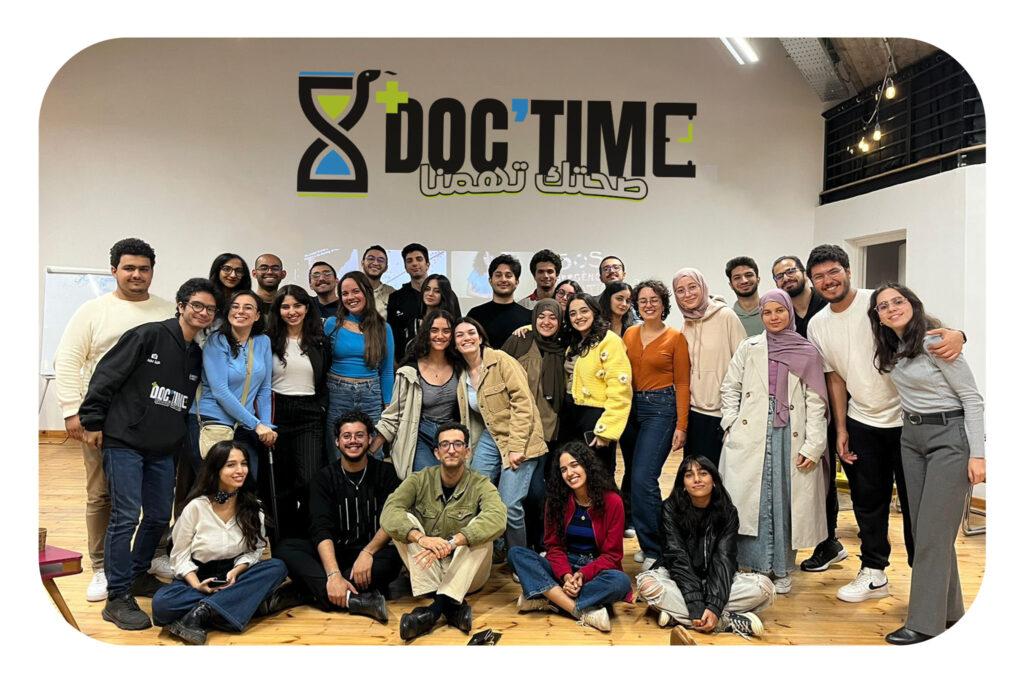
The first meeting with the full team, where each group presented their action plans and methodologies for the caravan's preparation.
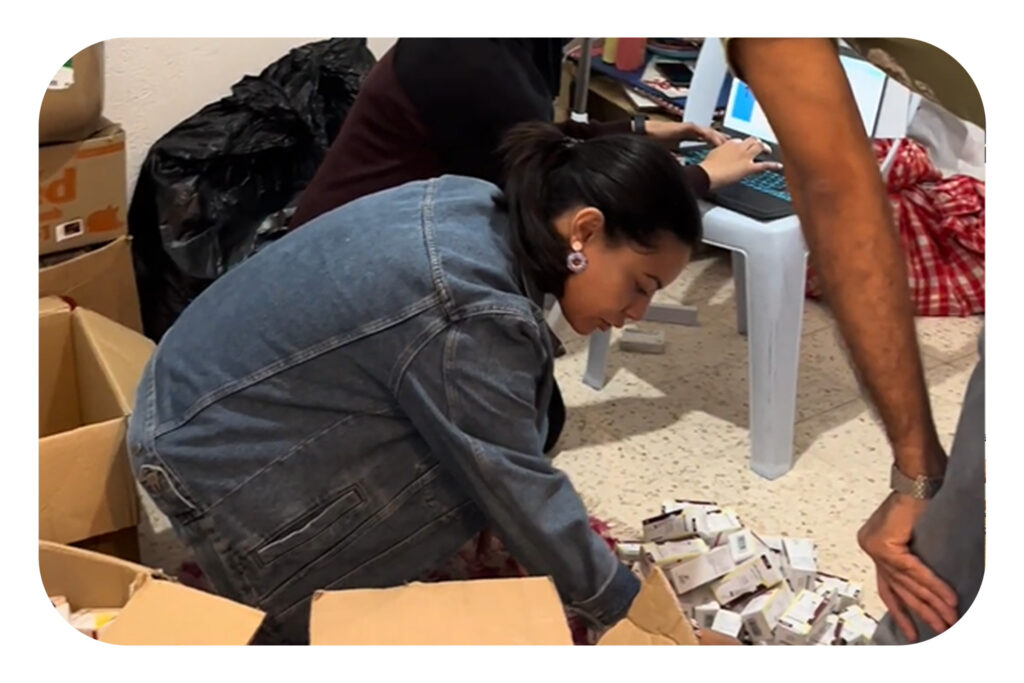
The start of late-night sessions to sort and organize medications by class and expiration date.
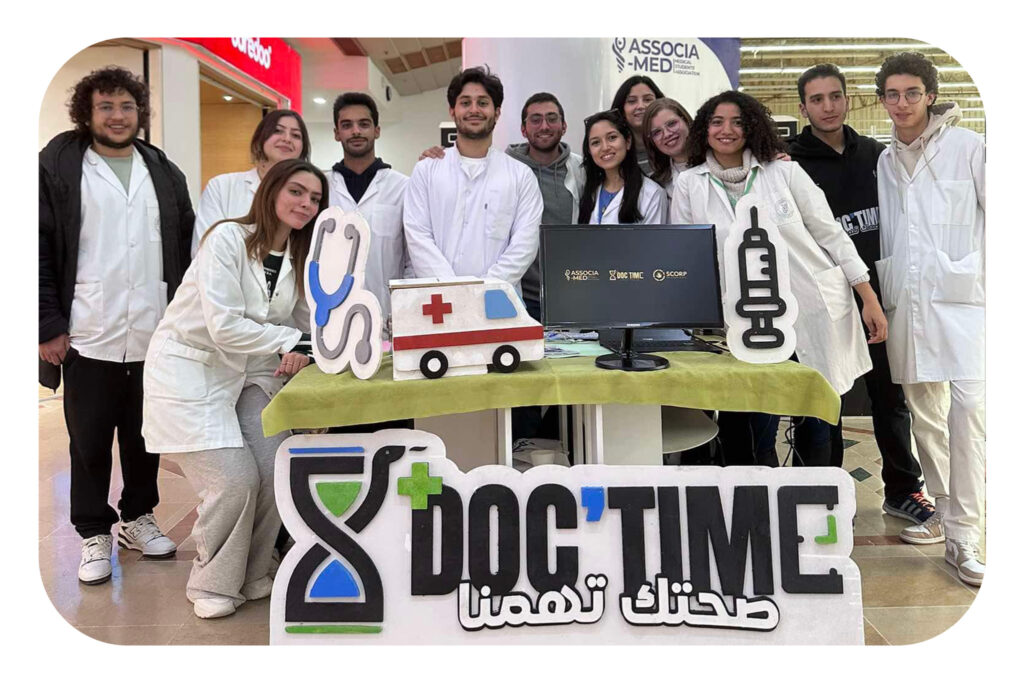
The first public stand was set up at Carrefour La Marsa to collect funds and promote the upcoming caravan.
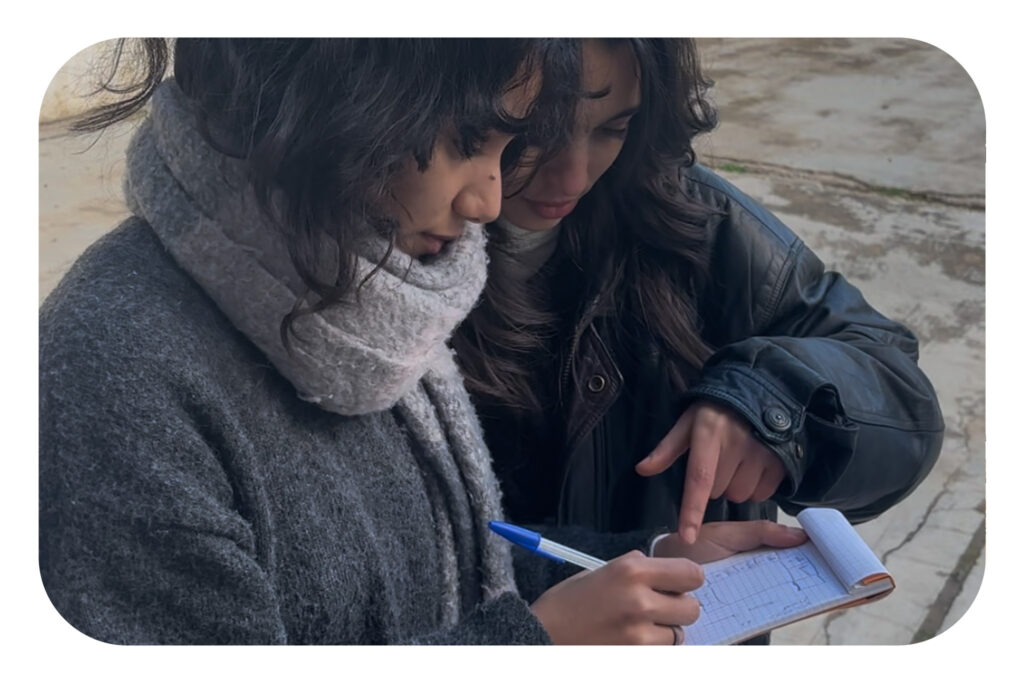
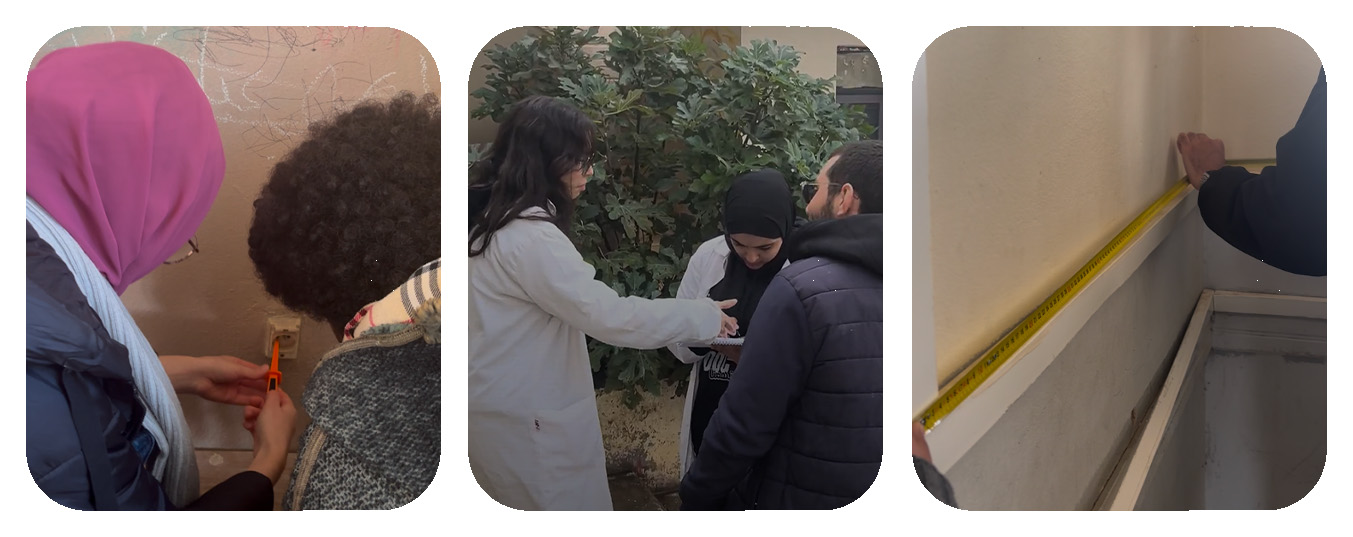
A second visit to Fernana was conducted to finalize logistical details, coordinate with local health officials, and prepare for the caravan's setup.
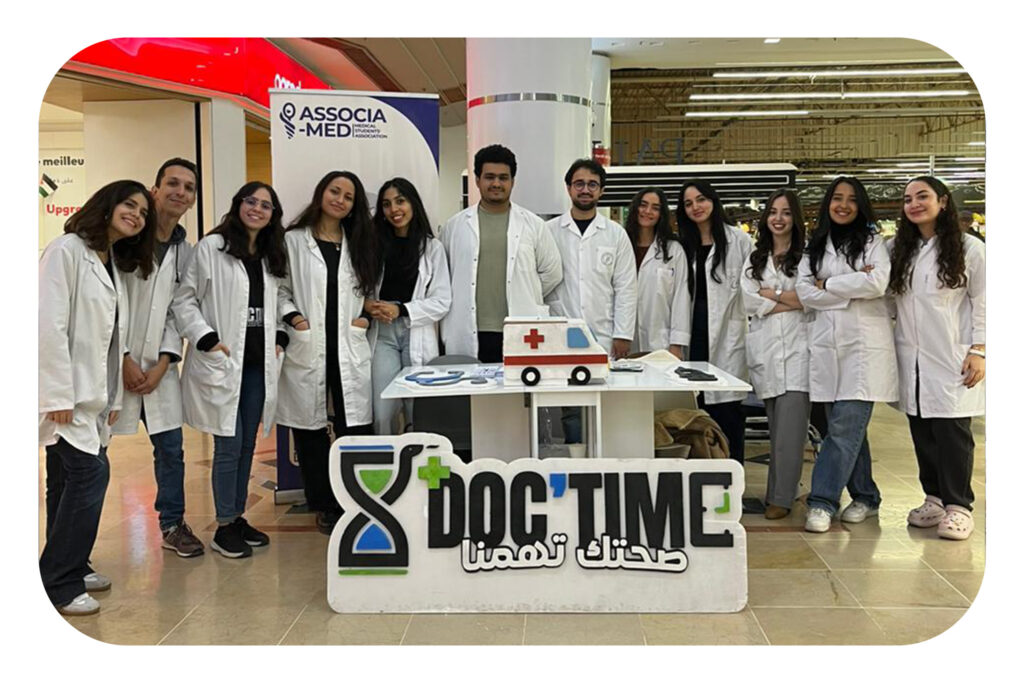
Additional donation stands were set up at Géant and Carrefour La Marsa to collect funds and in-kind donations.
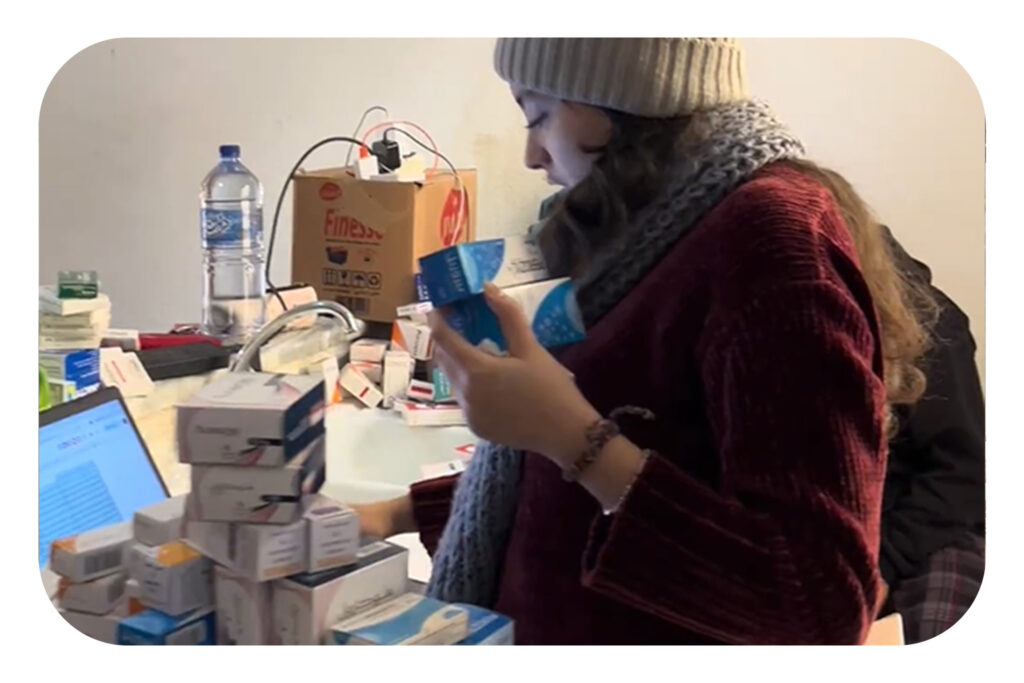
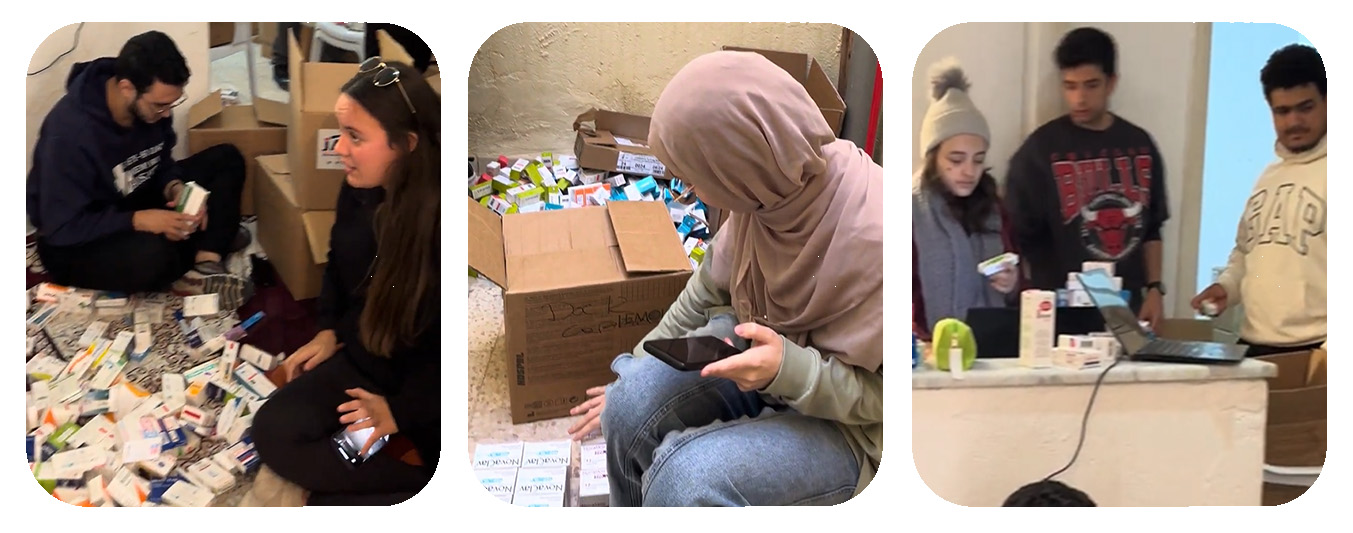
Following the completion of donation stands and tours to medical laboratories, a series of daily medication sorting sessions began, ensuring the on-site pharmacy would be ready for the caravan's day
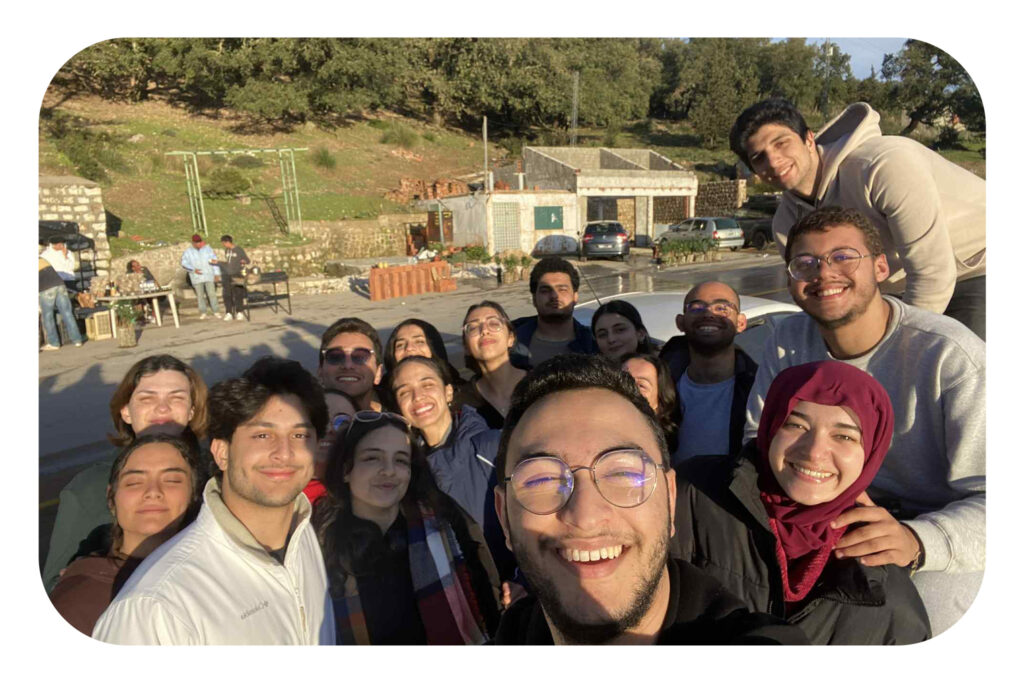
A small team visited Ain El Baya to raise awareness and inform the community about the free medical services that would be provided.
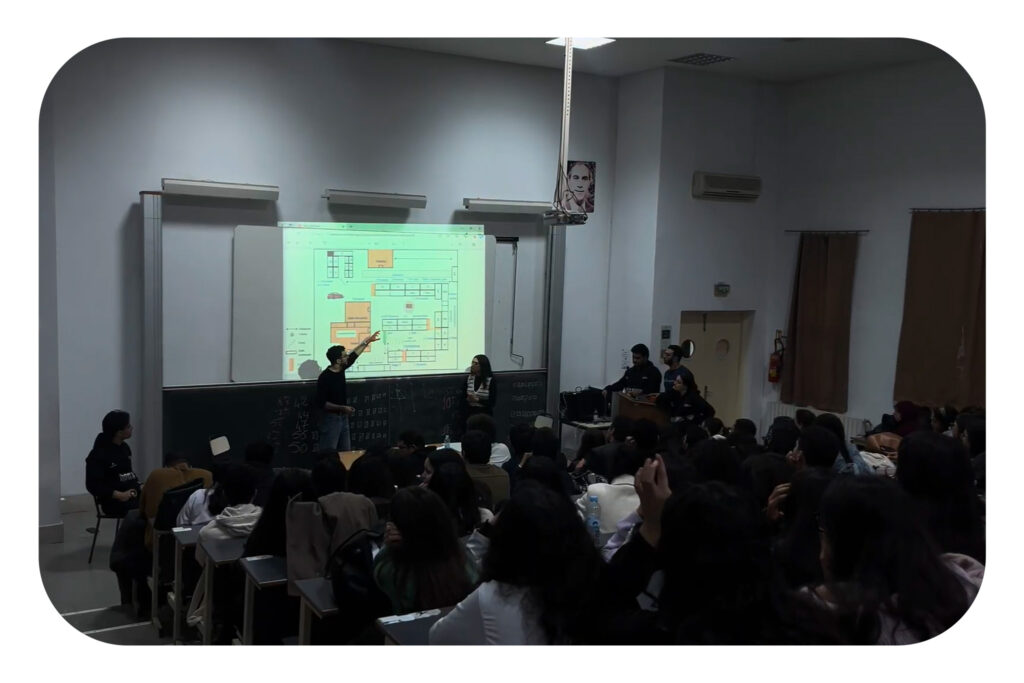
All medical student volunteers attended a mandatory training to prepare them for their roles during the caravan
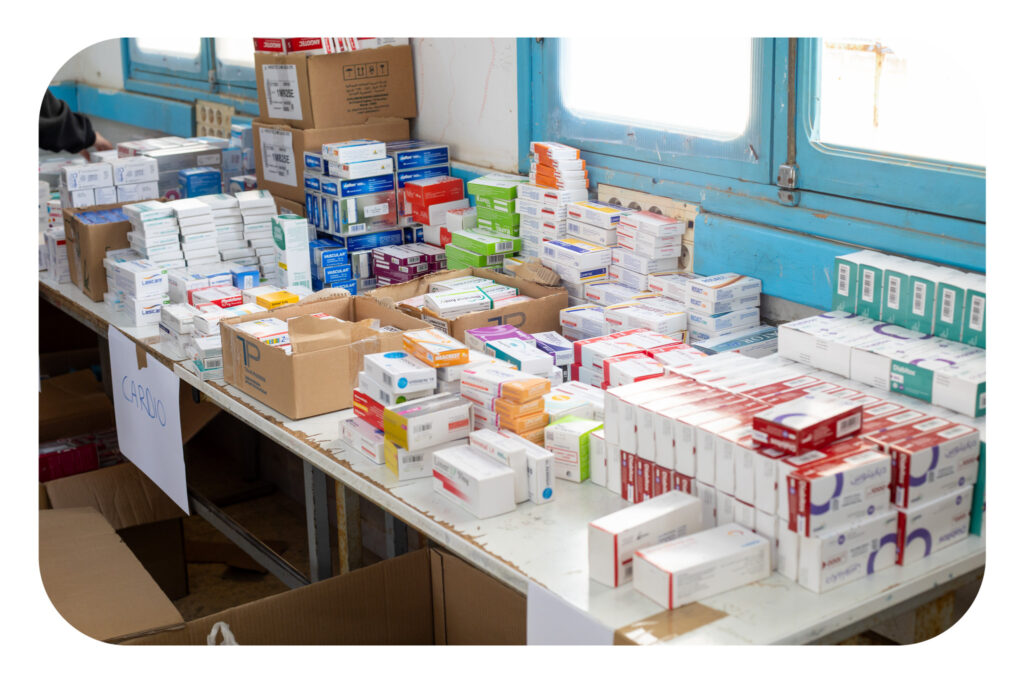
The day before the main event, the team arranged the Ain El Baya middle school, transforming it into a temporary hospital and organizing the pharmacy and medications.
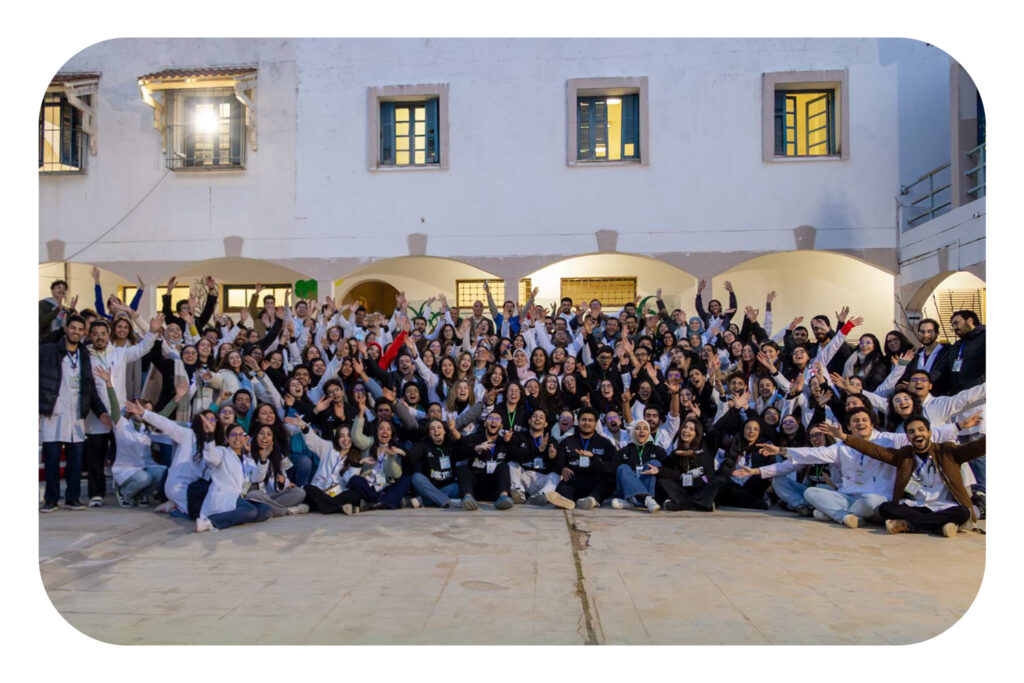

The main medical convoy took place in Ain El Baya, providing consultations, screenings, and free medication.
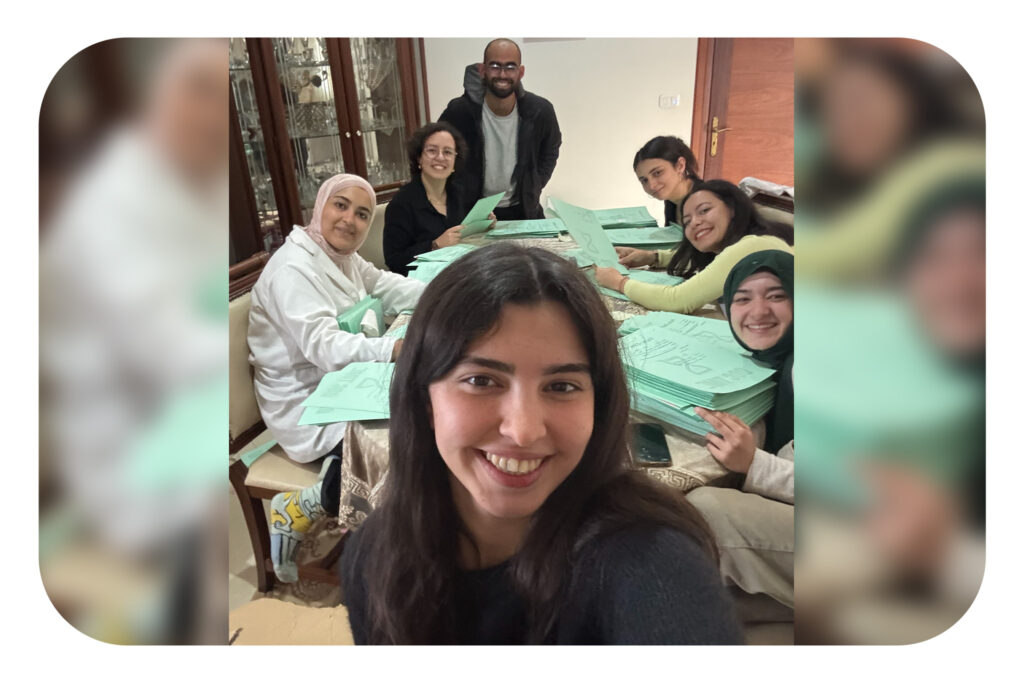
We analyze and reorder every medical file to provide ongoing support. We guide patients through the local healthcare system, explaining their next steps and ensuring they have continued access to care. We also organize specialized convoys for cataract and dental surgeries, as well as other general surgeries and pre-operative tests, staying with our patients every step of the way.
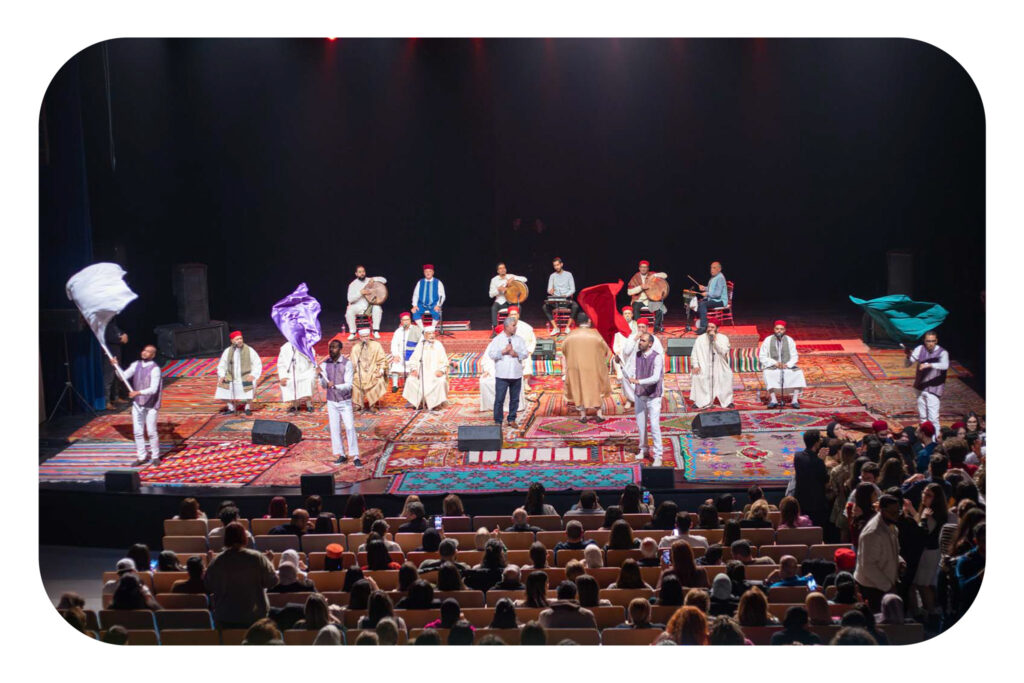

A charity concert was held to collect additional funds specifically for the upcoming surgical convoys.
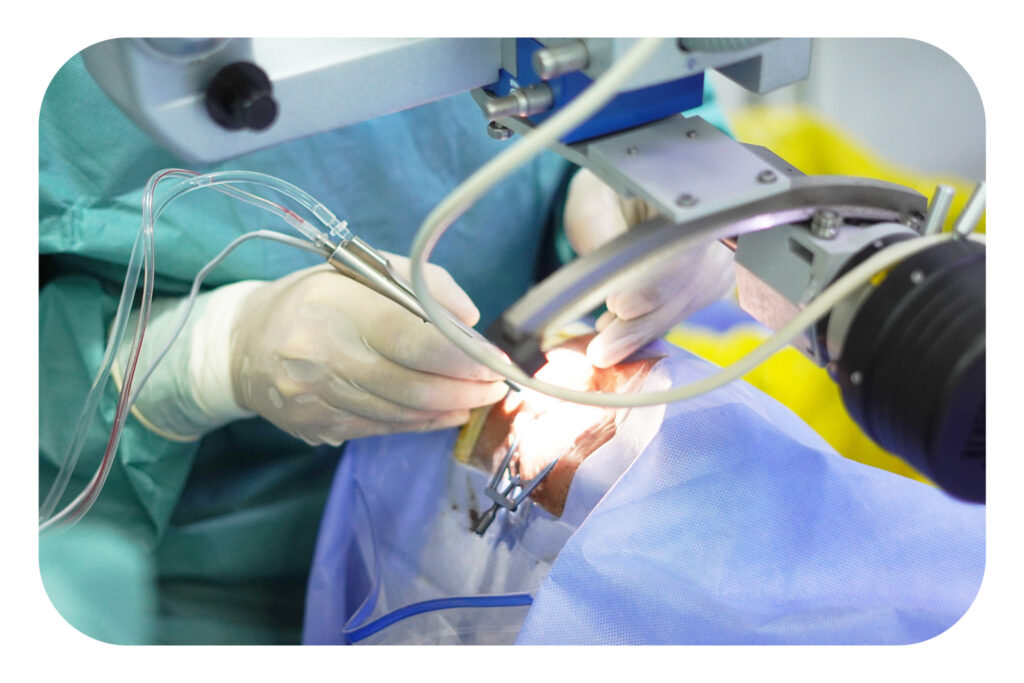

Dedicated caravans were organized to provide specialized eye care and perform cataract surgeries.
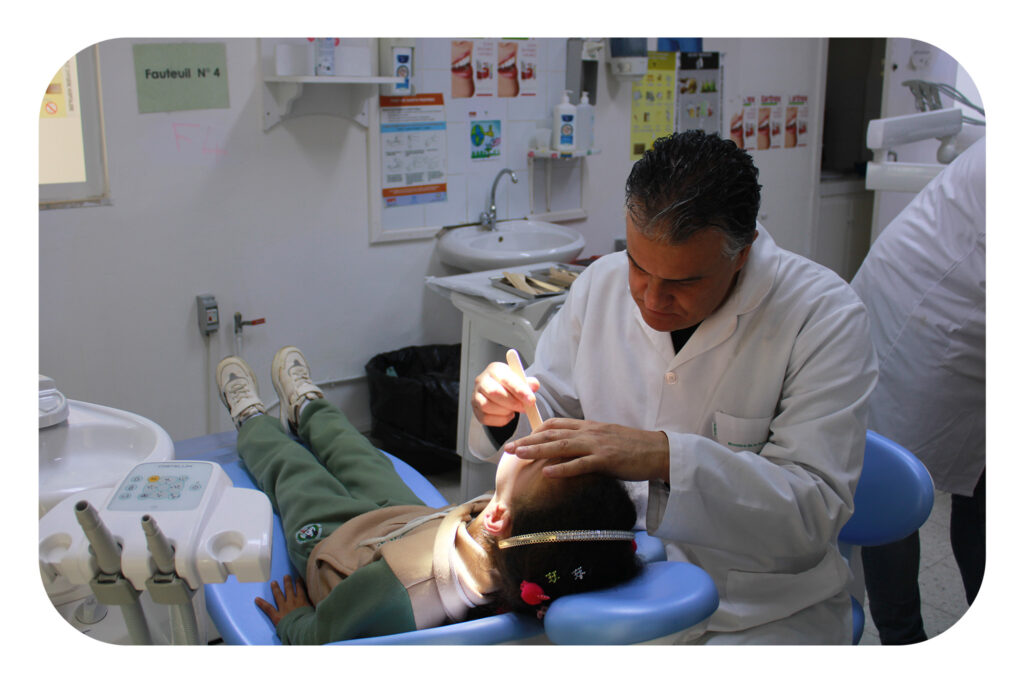
A specialized dental caravan was held to address the community's oral health needs.
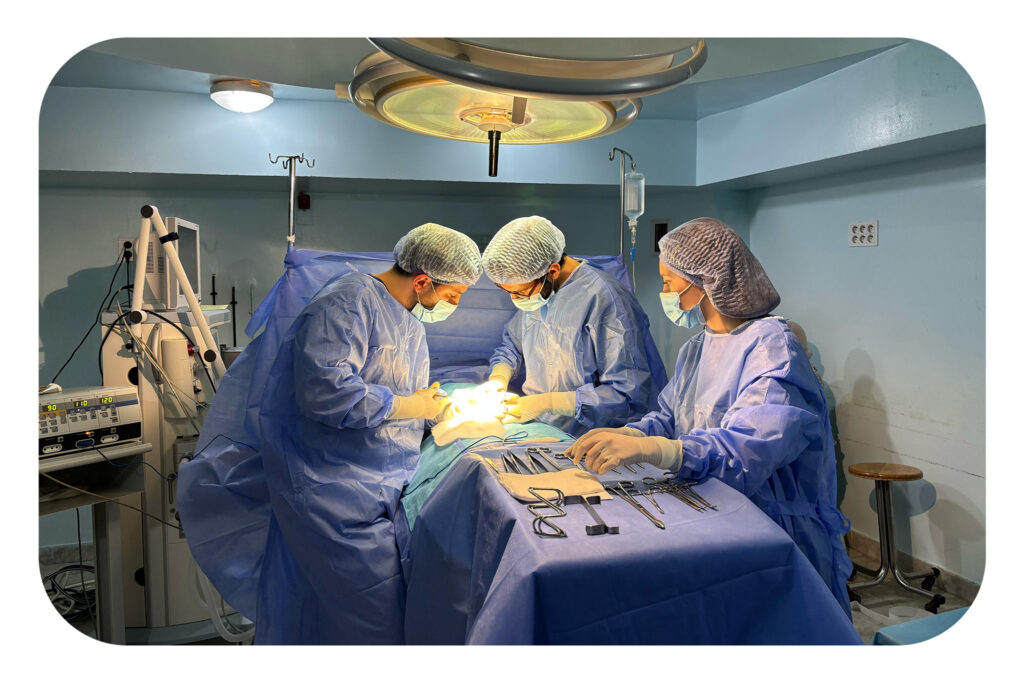
Beyond our dedicated surgical convoys, we organized and supported a wide range of other procedures. While these surgeries were dispersed across various hospitals, our team was with the patients every step of the way, from pre-operative tests to the final procedure.
Patron (mécène)
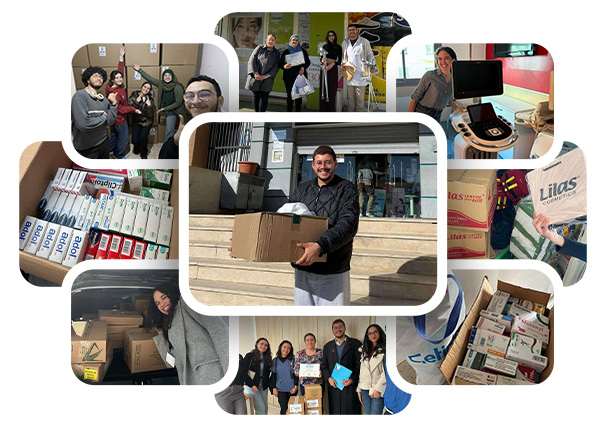
Our work is made possible by the generosity of our patrons, who provide donations with no benefits in return, contributing across multiple fronts:
Medical Support: Patrons supply essential items like medications and medical tools, ensuring our teams have the supplies needed to deliver high-quality care.
Logistical Support: They assist with our operational needs by donating fuel for transportation, covering printing costs, and providing food for volunteers on the day of the caravan, ensuring our team is well-cared for.
Community Support: Patrons also contribute essential items for distribution to the community, such as shampoo, deodorant, toothpaste, toothbrushes, and sanitary products, addressing a wider range of needs beyond medical care.
The Medical Caravan Layout
To make the most of the school’s layout, we designed an efficient and welcoming temporary hospital. Upon entering, patients are guided to the Depistage Room for initial blood pressure and blood sugar checks. From there, they move to the Triage Room, where general practitioners direct them to the appropriate specialty.
To make navigation easy, especially for those who can’t read, each specialty has a unique color and a sign in Arabic on its door. A dedicated Ophthalmology Circuit has its own waiting area for eye drops and a station for opticians. The gynecology circuit is intentionally located slightly out of sight and next to the pediatric circuit. This ensures privacy and comfort for mothers. The final stop is the pharmacy near the exit, where patients receive their free medication. Guides are on hand throughout the school to assist everyone, ensuring a smooth and stress-free experience.
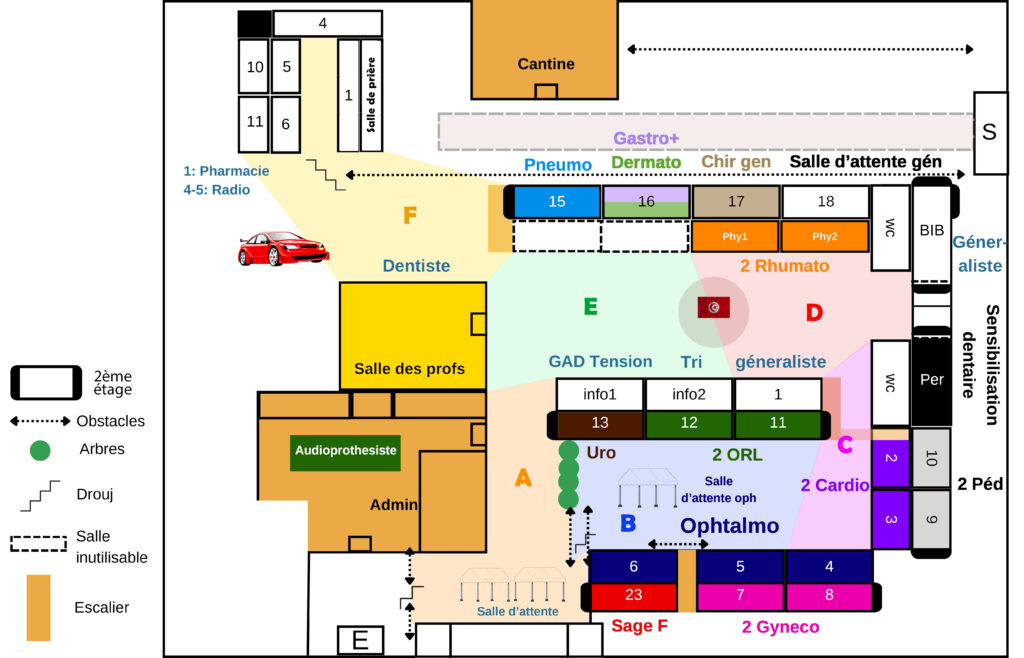
Our Media Presence
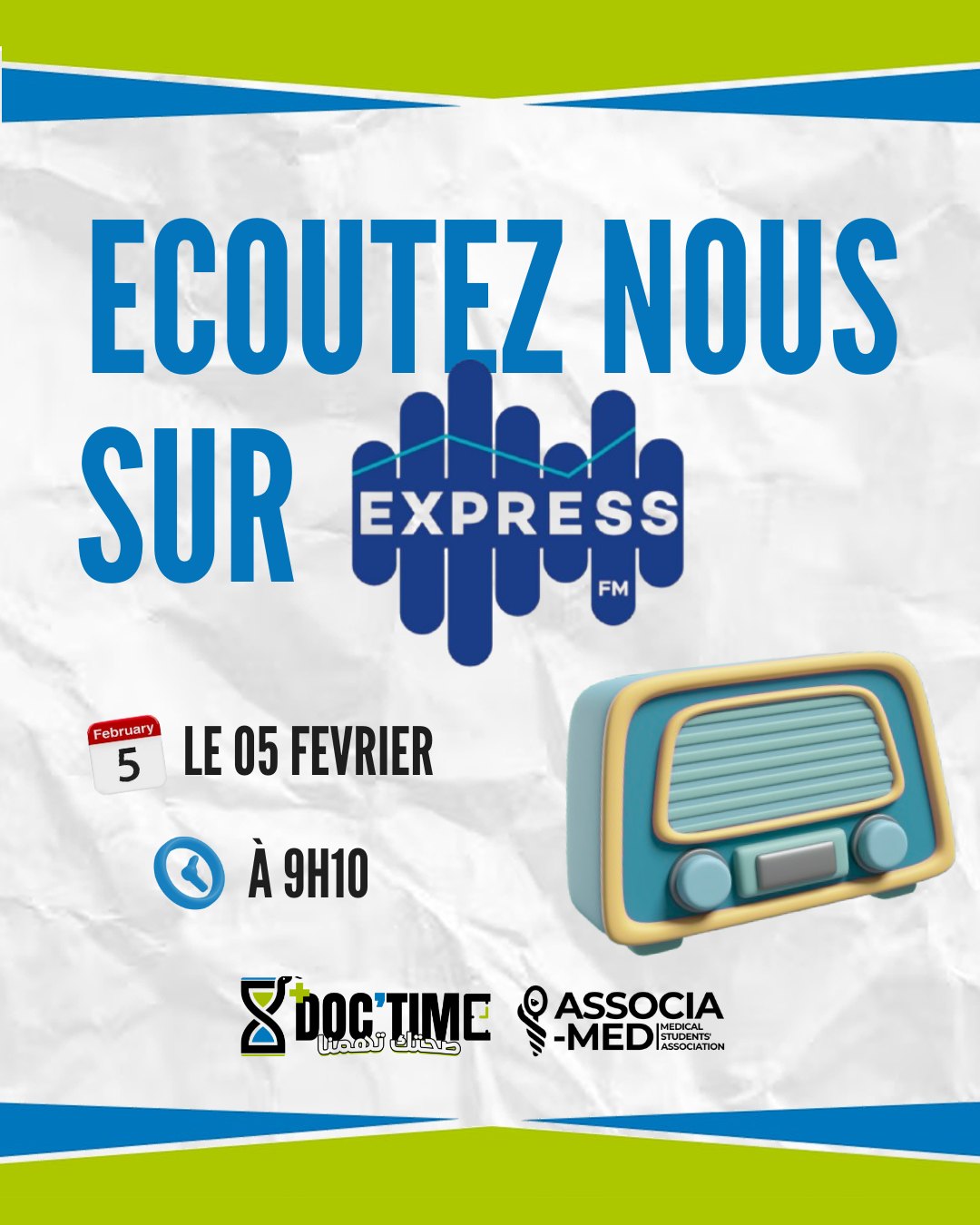
Radio: Express FM
at 9 am
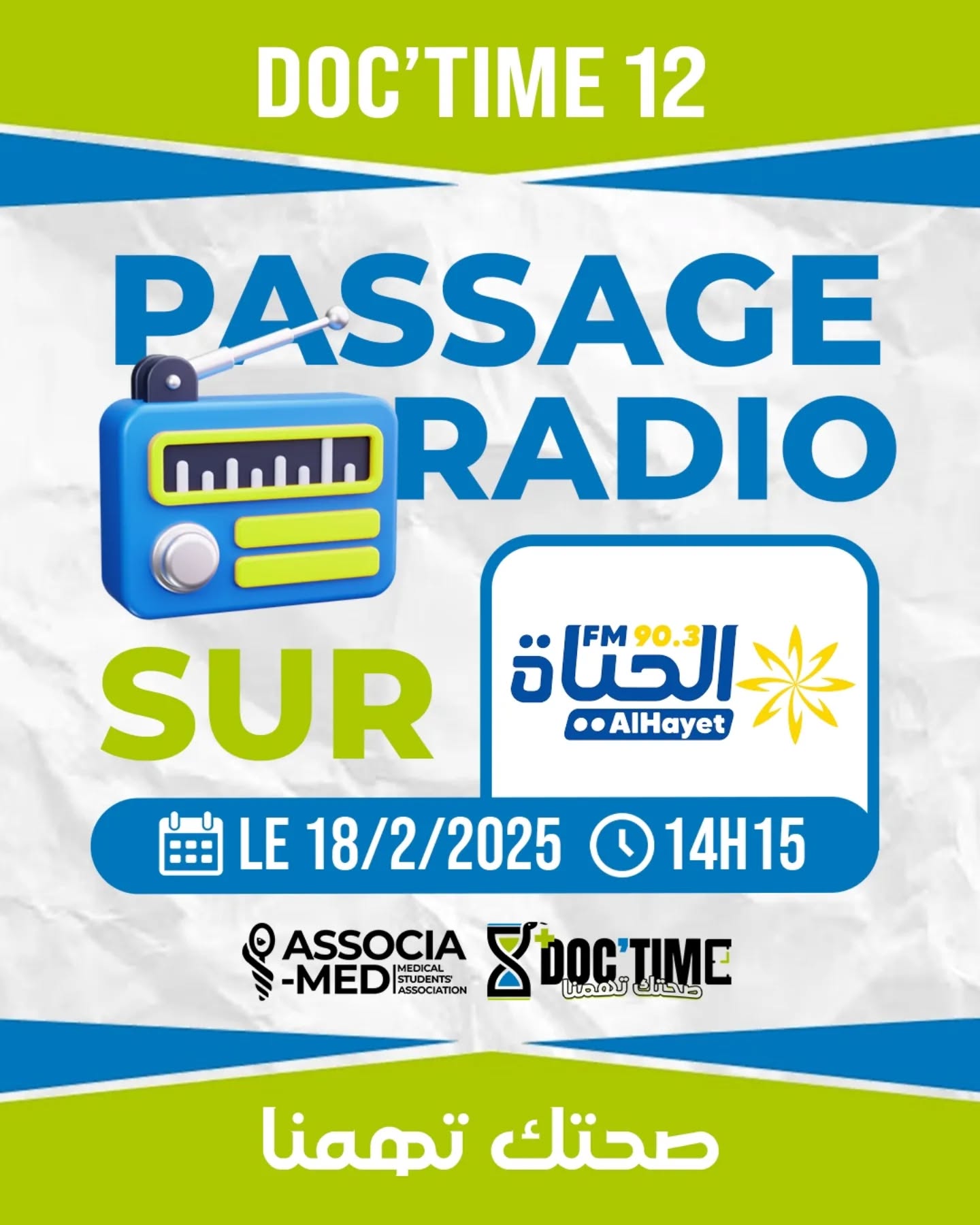
Radio: Al Hayet
at 14:15 am
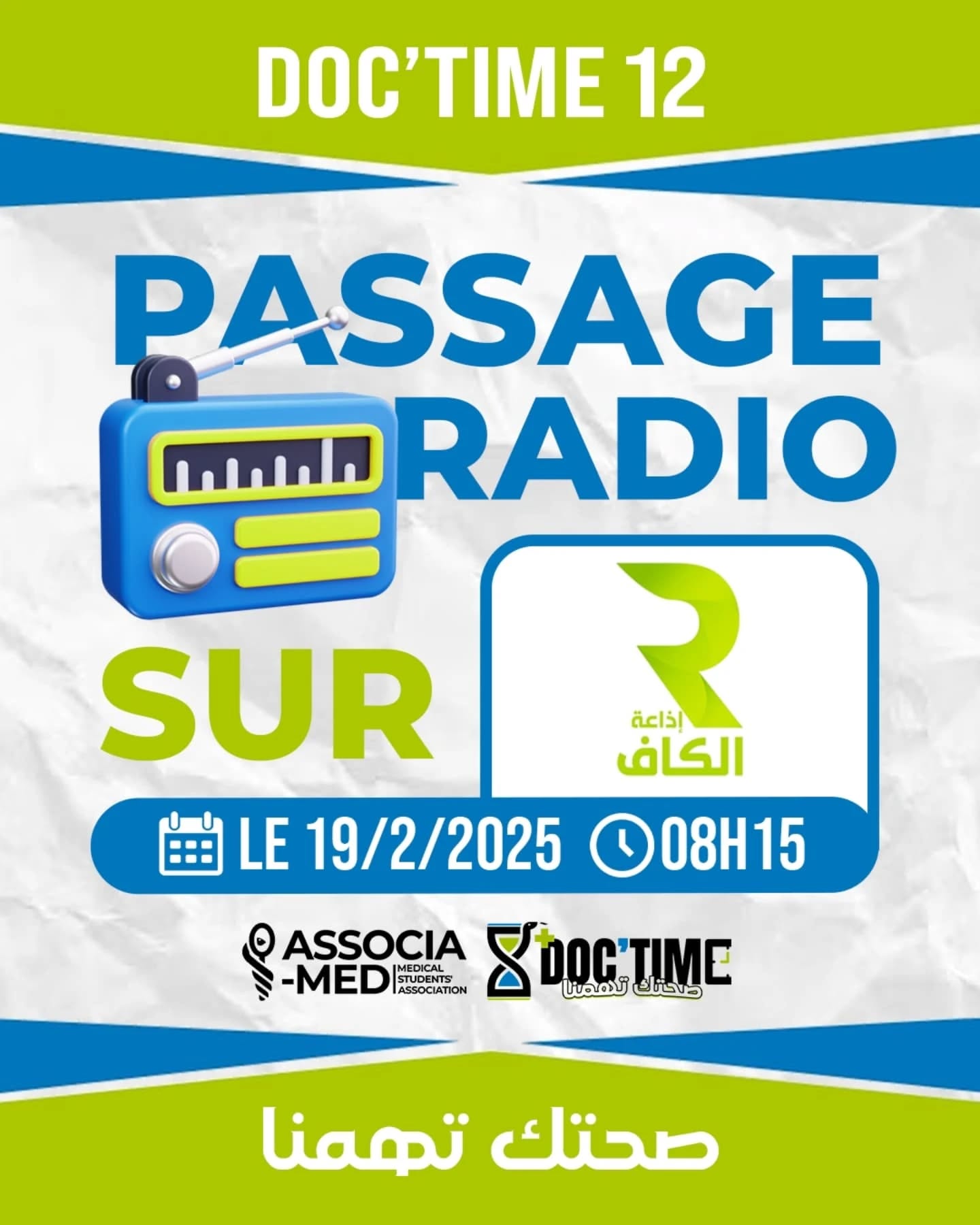
Radio: Le Kef
at 8:15 am
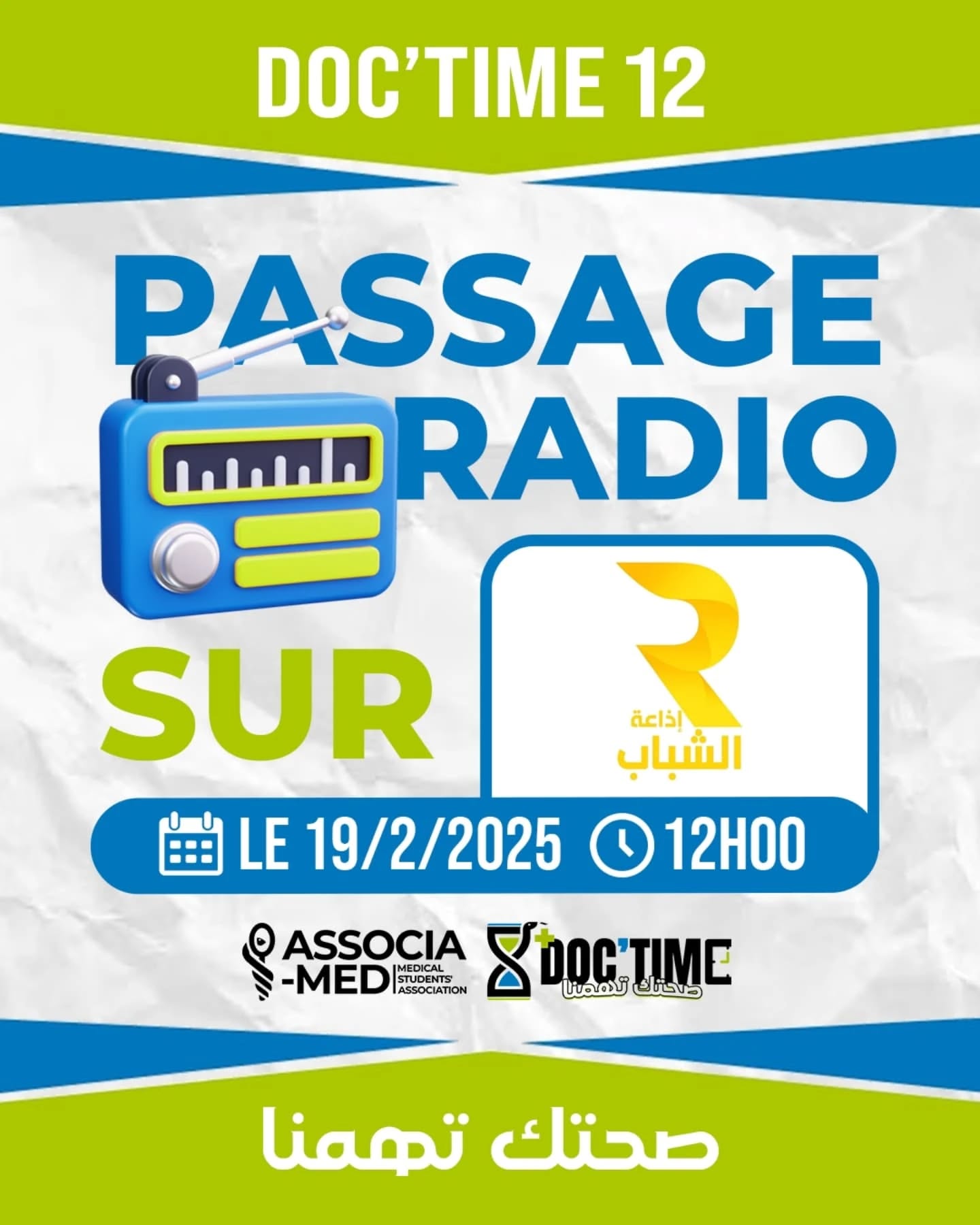
Radio: Jeune
at 12 pm
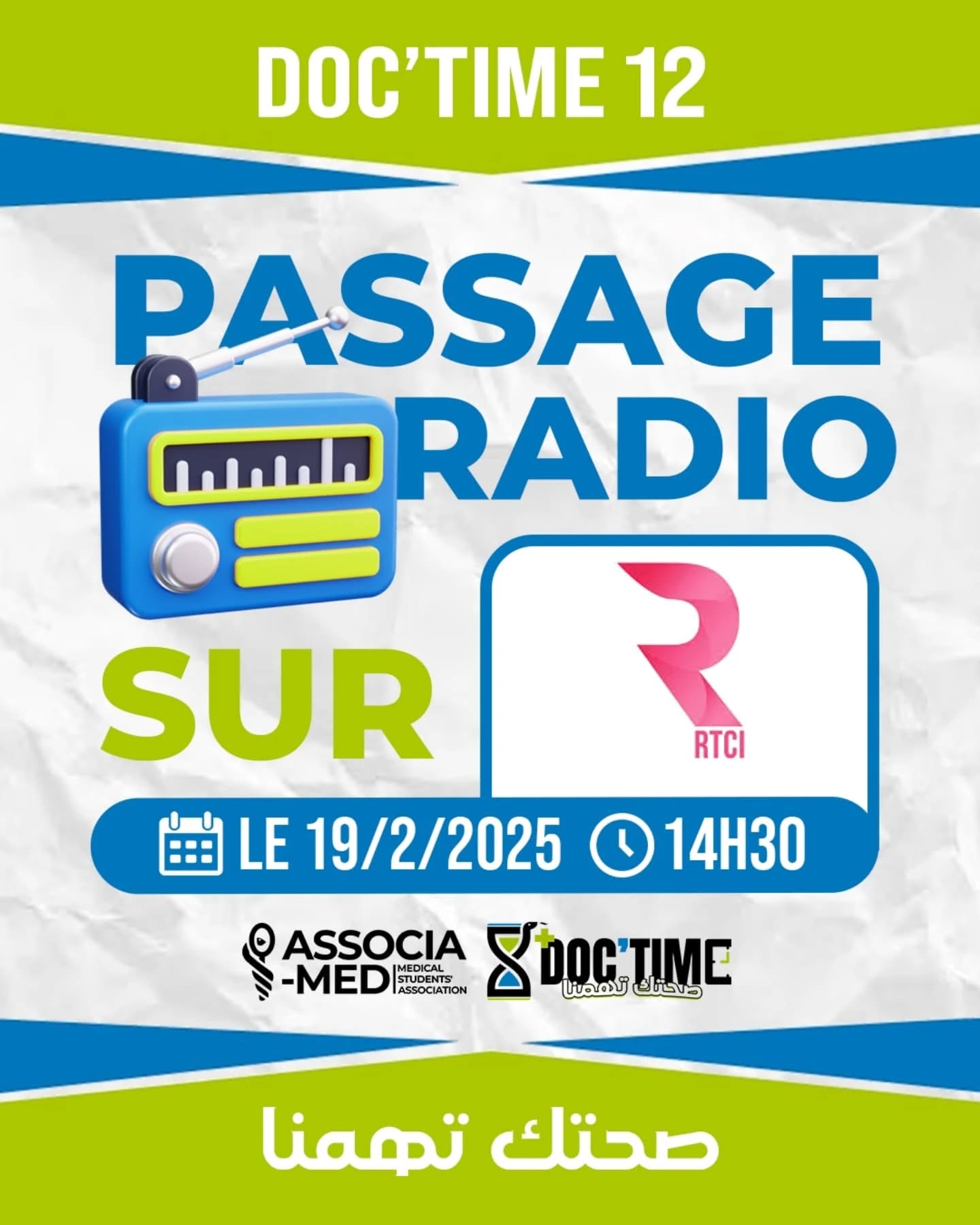
Radio: RTCI
at 2:30 pm
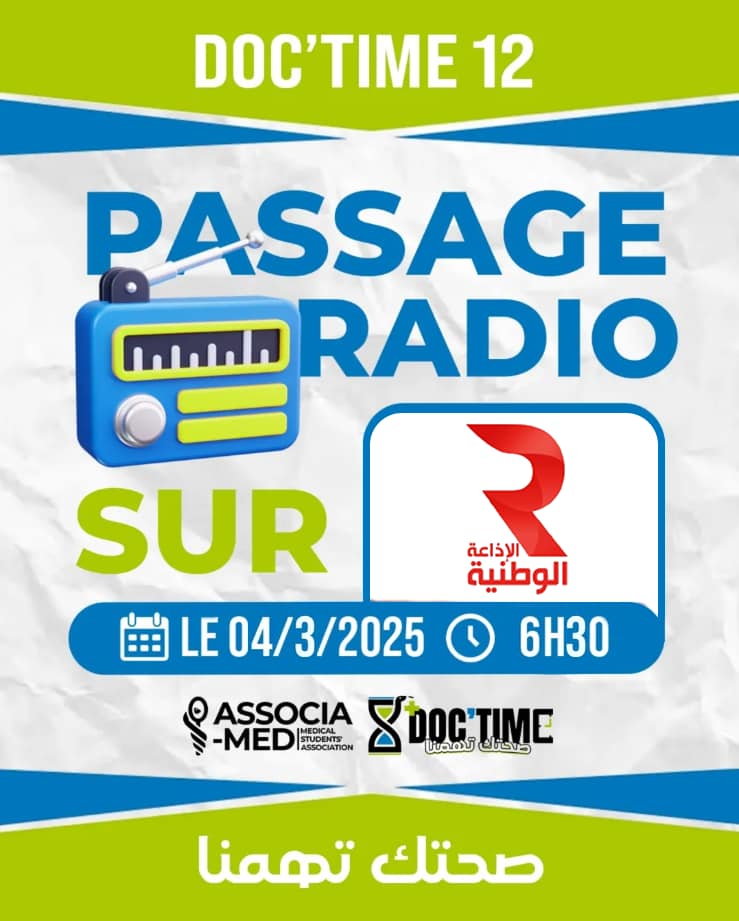
Radio: National Radio
at 6:30 am
Doc'Time XII In a Nutshell
Our medical campaign was a significant success, powered by the dedication of our volunteers and staff. We made a positive impact on over 1,200 patients and garnered extensive public support and media coverage.
Key Achievements:
+1200
patients received care
+2500
Free Consultations
13
medical specialties
+1300
Screening
44
Cervico-Vaginal Smears
free medication
We offered free medication to patients in need
imaging equipment
We brought mobile imaging equipment, including echo, echocardiogram, ECG, spirometry, and endoscopy to the location.
Mini mobile Caravan
A mobile medical caravan provided care directly to patients in their homes, ensuring we reached those most in need.
Distributions
we distributed essential hygiene products such as shampoo, deodorant, toothpaste, toothbrushes, and sanitary items
Team and Training
Our mission was made possible by the commitment of our medical and non-medical staff.
+160
medical student volunteers participated
+65
doctors, midwives, and audiologists contributed their expertise
Doc'Time 101
All volunteers received a dedicated training session to prepare them for their roles
Media & Outreach
DocShowTime
large-scale charity project to collect funds
6 donation stands
were set up in major commercial centers
11 Radio
appearances
1 television
appearance
2 articles
from the Agence Tunis Afrique Presse
Yaluna.tn
appearance
Medical Follow-Up
177 patients
Our medical team followed and referred a total of 177 patients across multiple specialties, ensuring they received the expert care they needed.
64 Rheumatology patients
We provided follow-up for 64 patients, with 24 of them referred to specialized rheumatology departments at hospitals including HCN, Mongi Slim, and La Rabta.
21 Cardiology patients
21 patients were monitored, and one child received care at La Rabta Hospital’s pediatric cardiology department.
8 Pediatrics patients
Our team followed 8 children at the Jendouba regional hospital’s outpatient clinic.
20 Pulmonology patients
We referred 20 patients to the Jendouba regional hospital’s outpatient clinic for further care.
44 Dermatology patients
44 patients were followed. Of these, 33 were referred to the Jendouba regional hospital’s outpatient clinic, while others received treatment at private clinics for procedures such as laser therapy.
Explorations
33 Lab Tests
33 patients received various lab tests at a private center, including thyroid, immunological, and other specific analyses
19 Pre-Anesthesia
19 pre-anesthesia evaluations were conducted at the Jendouba regional hospital for scheduled surgeries
11 Cardiology Explorations
11 patients received additional cardiac exams, including 5 rhythmic Holter monitors, one blood pressure Holter monitor, and various ultrasounds and stress tests.
11 Dermatology Explorations
11 patients had complementary skin tests (6 mycological, 5 scotch-tests)
19 chest x-rays
19 chest x-rays were performed at the Fernana regional hospital
9 Endoscopy Explorations
9 patients were scheduled for fibroscopies and colonoscopies at the Jendouba regional hospital.
Ophthalmology
2 Caravans
2 ophtalmic chirugical caravans: 7-8 March and 14-15 March
250 pairs of glasses
were distributed to patients
45 cataract
surgeries were successfully performed
Dental Medicine
32 imaging exams
were conducted (panoramic and periapical)
5 Orthodontics Treatment
5 patients were referred to La Rabta Hospital for interceptive treatment
10 Prosthetics & Care
10 patients were put on a list for adult dental medicine at La Rabta Hospital for complete or partial removable prosthetics and specific care.
30 General care appointments
30 patients received appointments at the Fernana regional hospital for various consultations.
Surgical Procedures and Interventions
1 neurosurgery emergency
One patient had emergency neurosurgery for spinal cord compression
11 ENT Surgery
were scheduled for procedures (tonsillectomy, septoplasty, adenoidectomy, etc.) at the La Rabta ENT (Ear, Nose, and Throat) department.
11 General Surgery
11 patients with hernias or eventrations were identified. 4 of them had surgery at the HCN surgery department, and 5 were scheduled for surgery at the Jendouba regional hospital.
5 Pediatric Surgery
5 children with hernias had surgery.
2 Bariatric Surgery
2 sleeve gastrectomy surgeries were scheduled.
